| Thursday, November 3, 2016 |
| 8:00-9:00am |
Registration and Continental Breakfast |
| 9:00-9:15am |
- Opening Remarks – Christine Lagarde (Managing Director, IMF)
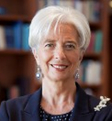 Born in Paris in 1956, Christine Lagarde completed high school in Le Havre and attended Holton Arms School in Bethesda (Maryland, USA). She then graduated from law school at University Paris X, and obtained a Master’s degree from the Political Science Institute in Aix en Provence. Born in Paris in 1956, Christine Lagarde completed high school in Le Havre and attended Holton Arms School in Bethesda (Maryland, USA). She then graduated from law school at University Paris X, and obtained a Master’s degree from the Political Science Institute in Aix en Provence.
After being admitted as a lawyer to the Paris Bar, Christine Lagarde joined the international law firm of Baker & McKenzie as an associate, specializing in Labor, Anti-trust, and Mergers & Acquisitions. A member of the Executive Committee of the Firm in 1995, Christine Lagarde became the Chairman of the Global Executive Committee of Baker & McKenzie in 1999, and subsequently Chairman of the Global Strategic Committee in 2004.
Christine Lagarde joined the French government in June 2005 as Minister for Foreign Trade. After a brief stint as Minister for Agriculture and Fisheries, in June 2007 she became the first woman to hold the post of Finance and Economy Minister of a G-7 country. From July to December 2008, she also chaired the ECOFIN Council, which brings together Economics and Finance Ministers of the European Union, and helped foster international policies related to financial supervision, regulation, and strengthening global economic governance. As Chairman of the G-20 when France took over its presidency for the year 2011, she set in motion a wide-ranging work agenda on the reform of the international monetary system.
On July 5, 2011, Christine Lagarde became the eleventh Managing Director of the IMF, and the first woman to hold that position. On February 19, 2016, the IMF Executive Board selected her to serve as IMF Managing Director for a second five-year term starting on July 5, 2016. Video
|
| Session 1: Monetary and Exchange Rate Policy |
| 9:15—11:15am |
Video
Chair: David Lipton (First Deputy Managing Director, IMF) -
 Mr. David Lipton assumed the position of First Deputy Managing Director of the International Monetary Fund since September 1, 2011. Before joining the Fund, he was Special Assistant to the President, and served as Senior Director for International Economic Affairs at the National Economic Council and National Security Council at the White House. Previously, Mr. Lipton was a Managing Director at Citi. Prior to joining Citi in May 2005, he was at Moore Capital Management for five years and, before that he spent a year at the Carnegie Endowment for International Peace. Mr. Lipton served in the Clinton administration at the Treasury Department from 1993 to 1998, including as Assistant Secretary and Under Secretary of the Treasury for International Affairs. Before that, he was a fellow at the Woodrow Wilson Center of Scholars. From 1989 to 1992, he worked as economic adviser to the governments of Russia, Poland and Slovenia. Mr. Lipton began his career with eight years on the IMF staff. He has a Ph.D. and M.A. from Harvard University in 1982 and a B.A. from Wesleyan University in 1975. Mr. Lipton is married to Susan Galbraith and has three children, Anna, Sasha, and Gabriel. Mr. David Lipton assumed the position of First Deputy Managing Director of the International Monetary Fund since September 1, 2011. Before joining the Fund, he was Special Assistant to the President, and served as Senior Director for International Economic Affairs at the National Economic Council and National Security Council at the White House. Previously, Mr. Lipton was a Managing Director at Citi. Prior to joining Citi in May 2005, he was at Moore Capital Management for five years and, before that he spent a year at the Carnegie Endowment for International Peace. Mr. Lipton served in the Clinton administration at the Treasury Department from 1993 to 1998, including as Assistant Secretary and Under Secretary of the Treasury for International Affairs. Before that, he was a fellow at the Woodrow Wilson Center of Scholars. From 1989 to 1992, he worked as economic adviser to the governments of Russia, Poland and Slovenia. Mr. Lipton began his career with eight years on the IMF staff. He has a Ph.D. and M.A. from Harvard University in 1982 and a B.A. from Wesleyan University in 1975. Mr. Lipton is married to Susan Galbraith and has three children, Anna, Sasha, and Gabriel.
The Folk Theorem of Decreasing Effectiveness of Monetary Policy: What Do the Data Say?
Paper
Ugo Panizza (Graduate Institute of International and Development Studies) and Charles Wyplosz (Graduate Institute of International and Development Studies)
Presentation 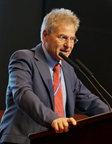 Charles Wyplosz is Professor of International Economics at the Graduate Institute in Geneva where he is Director of the International Centre for Money and Banking Studies. His main research areas include financial crises, European monetary integration, fiscal policy and regional monetary integration. He is the co-author of two leading textbooks and has published several books and many professional articles. He has served as consultant to many international organizations and governments and is a frequent contributor to public media. A French national, Charles Wyplosz holds degrees in Engineering and Statistics from Paris and a PhD in Economics from Harvard University. Charles Wyplosz is Professor of International Economics at the Graduate Institute in Geneva where he is Director of the International Centre for Money and Banking Studies. His main research areas include financial crises, European monetary integration, fiscal policy and regional monetary integration. He is the co-author of two leading textbooks and has published several books and many professional articles. He has served as consultant to many international organizations and governments and is a frequent contributor to public media. A French national, Charles Wyplosz holds degrees in Engineering and Statistics from Paris and a PhD in Economics from Harvard University.
Discussant: Jesper Lindé (Sveriges Riksbank and IMF)
Presentation  Jesper Lindé defended his PhD-thesis in empirical macroeconomics at the Stockholm School of Economics in 1999. Between 1999-2008 Lindé worked at Sveriges Riksbank, first as research economist and then as head of the modelling unit at the monetary policy department (2006-2008). In the fall of 2008, Lindé left Riksbank to take up a position as Section Chief in the Division of International Finance at the Board of Governors of the Federal Reserve System. In 2014, Lindé returned to Riksbank as Head of Research, a position he is currently on leave from to serve as resident scholar at the IMF. His main research interests are empirical and monetary macroeconomics, and he has recently published papers on the effects of fiscal policy in liquidity traps and currency unions in leading academic outlets like the American Economic Review, the Journal of the European Economic Association, the European Economic Review, and the NBER Macroeconomics Annual. Lindé is adjunct professor at the Stockholm School of Economics and research fellow at the Centre for Economic Policy Research (CEPR). Jesper Lindé defended his PhD-thesis in empirical macroeconomics at the Stockholm School of Economics in 1999. Between 1999-2008 Lindé worked at Sveriges Riksbank, first as research economist and then as head of the modelling unit at the monetary policy department (2006-2008). In the fall of 2008, Lindé left Riksbank to take up a position as Section Chief in the Division of International Finance at the Board of Governors of the Federal Reserve System. In 2014, Lindé returned to Riksbank as Head of Research, a position he is currently on leave from to serve as resident scholar at the IMF. His main research interests are empirical and monetary macroeconomics, and he has recently published papers on the effects of fiscal policy in liquidity traps and currency unions in leading academic outlets like the American Economic Review, the Journal of the European Economic Association, the European Economic Review, and the NBER Macroeconomics Annual. Lindé is adjunct professor at the Stockholm School of Economics and research fellow at the Centre for Economic Policy Research (CEPR).
ECB Interventions in Distressed Sovereign Debt Markets: The Case of Greek Bonds
Paper
Christoph Trebesch (University of Munich) and Jeromin Zettelmeyer (Peterson Institute)
Presentation -
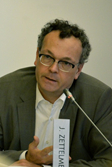 Jeromin Zettelmeyer is Senior Fellow at the Peterson Institute for International Economics. Previously, he was Director-General for Economic Policy at the German Ministry for Economic Affairs (2014-16), Director of Research and Deputy Chief Economist of the European Bank for Reconstruction and Development (2008-2014) and a staff member in the Research, Western Hemisphere and European II departments of the International Monetary Fund (1994-2008). He has done research on sovereign debt, financial crises, growth, and transition to market, and policy work on transition economies, Latin America, the European Economic and Monetary Union, and Germany, where he coordinated a government effort to increase public and private investment. He is co-author of a book on sovereign debt crises and holds degrees from the University of Bonn (1990) and MIT (1995). Jeromin Zettelmeyer is Senior Fellow at the Peterson Institute for International Economics. Previously, he was Director-General for Economic Policy at the German Ministry for Economic Affairs (2014-16), Director of Research and Deputy Chief Economist of the European Bank for Reconstruction and Development (2008-2014) and a staff member in the Research, Western Hemisphere and European II departments of the International Monetary Fund (1994-2008). He has done research on sovereign debt, financial crises, growth, and transition to market, and policy work on transition economies, Latin America, the European Economic and Monetary Union, and Germany, where he coordinated a government effort to increase public and private investment. He is co-author of a book on sovereign debt crises and holds degrees from the University of Bonn (1990) and MIT (1995).
Discussant: Athanasios Orphanides (MIT)
Presentation  Athanasios Orphanides is a Professor of the Practice of Global Economics and Management at the MIT Sloan School of Management. Orphanides is also a Research Fellow of the Centre for Economic Policy Research, a Senior Fellow of the Center for Financial Studies, a Research Fellow of the Institute for Monetary and Financial Stability and a member of the Shadow Open Market Committee. His research interests are on central banking, finance, and political economy and he has published extensively on these topics. He has also contributed to the ongoing debate on the euro area crisis. Athanasios Orphanides is a Professor of the Practice of Global Economics and Management at the MIT Sloan School of Management. Orphanides is also a Research Fellow of the Centre for Economic Policy Research, a Senior Fellow of the Center for Financial Studies, a Research Fellow of the Institute for Monetary and Financial Stability and a member of the Shadow Open Market Committee. His research interests are on central banking, finance, and political economy and he has published extensively on these topics. He has also contributed to the ongoing debate on the euro area crisis.
From May 2007 to May 2012, Orphanides served a five-year term as governor of the Central Bank of Cyprus and was a member of the Governing Council of the European Central Bank. Following the creation of the European Systemic Risk Board in 2010, he was elected a member of its first Steering Committee. Earlier, he served as senior adviser at the Board of Governors of the Federal Reserve System, where he had started his professional career as an economist. Athanasios Orphanides obtained his undergraduate degrees in mathematics and economics as well as a PhD in economics from MIT.
The Tradeoffs in Leaning Against the Wind
Paper | Presentation
François Gourio (Federal Reserve Bank of Chicago), Anil K. Kashyap (The University of Chicago Booth School of Business) and Jae Sim (Federal Reserve Board) 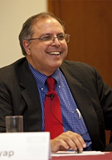 Anil Kashyap is the Edward Eagle Brown Professor of Economics and Finance at the University of Chicago’s Booth School of Business. His research focuses on financial intermediation and regulation, the Japanese economy, price setting, and monetary policy. He is currently on leave at the Bank of England as a Senior Houblon Norman George fellow. He also serves as a consultant for the Federal Reserve Bank of Chicago and as a research associate for the National Bureau of Economic Research and is on the board of directors of the Bank of Italy’s Einuadi Institute of Economics and Finance. Kashyap is also one of the academic members of the Bellagio Group (whose non-academic members include the Deputy Central Bank Governors and Vice Ministers of Finance of the G7 countries). This experience, along with his research and other consulting and advising to central banks and finance ministries around the world, has helped him create two unique elective courses: “Understanding Central Banks” and “The Analytics of Financial Crises.” Anil Kashyap is the Edward Eagle Brown Professor of Economics and Finance at the University of Chicago’s Booth School of Business. His research focuses on financial intermediation and regulation, the Japanese economy, price setting, and monetary policy. He is currently on leave at the Bank of England as a Senior Houblon Norman George fellow. He also serves as a consultant for the Federal Reserve Bank of Chicago and as a research associate for the National Bureau of Economic Research and is on the board of directors of the Bank of Italy’s Einuadi Institute of Economics and Finance. Kashyap is also one of the academic members of the Bellagio Group (whose non-academic members include the Deputy Central Bank Governors and Vice Ministers of Finance of the G7 countries). This experience, along with his research and other consulting and advising to central banks and finance ministries around the world, has helped him create two unique elective courses: “Understanding Central Banks” and “The Analytics of Financial Crises.”
Discussant: Galina Hale (Federal Reserve Bank of San Francisco)
Presentation  Galina Hale (Borisova) is a Research Advisor at the Federal Reserve Bank of San Francisco, where she worked since 2006. Prior to her career at the Federal Reserve she was an assistant professor in the economics department of Yale University, where she taught international finance. She also taught a number of courses as a visiting faculty at Stanford and UC Berkeley. Galina began to study economics in Russia, first in Moscow State University economics department and then at the New Economic School's master's program. When in Russia, she briefly worked as a consultant for the Russian Ministry of Finance. She received her PhD in economics in 2002 from UC Berkeley, under the supervision of Barry Eichengreen. Galina's research interests lie in three main areas: understanding patterns of international capital flows and international financial crises, empirical analysis of corporate debt structure of private firms, and international banking. Galina has published her work in such journals as Journal of European Economic Association, Journal of International Economics, Journal of Financial Economics, Journal of Banking and Finance, IMF Economic Review, among others. She co-wrote with Cheryl Long a monograph “Foreign Direct Investment in China: Winners and Losers.” Galina Hale (Borisova) is a Research Advisor at the Federal Reserve Bank of San Francisco, where she worked since 2006. Prior to her career at the Federal Reserve she was an assistant professor in the economics department of Yale University, where she taught international finance. She also taught a number of courses as a visiting faculty at Stanford and UC Berkeley. Galina began to study economics in Russia, first in Moscow State University economics department and then at the New Economic School's master's program. When in Russia, she briefly worked as a consultant for the Russian Ministry of Finance. She received her PhD in economics in 2002 from UC Berkeley, under the supervision of Barry Eichengreen. Galina's research interests lie in three main areas: understanding patterns of international capital flows and international financial crises, empirical analysis of corporate debt structure of private firms, and international banking. Galina has published her work in such journals as Journal of European Economic Association, Journal of International Economics, Journal of Financial Economics, Journal of Banking and Finance, IMF Economic Review, among others. She co-wrote with Cheryl Long a monograph “Foreign Direct Investment in China: Winners and Losers.”
|
| 11:15-11:30am |
***Coffee Break*** |
| Session 2: Structural Reforms, Investment and Growth |
| 11:30–1:00pm |
Video
Chair: Poul Thomsen (Director, European Department, IMF)  Poul Thomsen is the Director of the IMF’s European Department. He is currently in charge of the IMF’s programs with Greece and Portugal, and also oversees the work of other country teams, including Iceland, Romania, and Ukraine. During the 1990s and early 2000s, Thomsen gained extensive knowledge of the economic and social problems facing the countries in Central and Eastern Europe through multiple assignments in the region, including as the IMF’s Senior Resident Representative and Head of the Fund’s Moscow Office. Poul Thomsen is the Director of the IMF’s European Department. He is currently in charge of the IMF’s programs with Greece and Portugal, and also oversees the work of other country teams, including Iceland, Romania, and Ukraine. During the 1990s and early 2000s, Thomsen gained extensive knowledge of the economic and social problems facing the countries in Central and Eastern Europe through multiple assignments in the region, including as the IMF’s Senior Resident Representative and Head of the Fund’s Moscow Office.
Investment Hollowing Out
Paper
Lewis Alexander (Nomura) and Janice Eberly (Kellogg School of Management)
Presentation  Janice C. Eberly is the James R. and Helen D. Russell Professor of Finance and former Chair of the Finance Department. Eberly served as Assistant Secretary for Economic Policy at the U.S. Treasury in 2011-2013. She was Chief Economist at the Treasury, leading the Office of Economic Policy in analysis of the U.S. and global economies and development of policy recommendations on micro, macroeconomic and financial issues. Eberly’s research focuses on finance and macroeconomics, addressing firms’ capital budgeting decisions and household spending and portfolios. Her work has been published in the American Economic Review, Econometrica, and the Journal of Political Economy, among other academic journals. She received a Sloan Research Fellowship and was elected a fellow of the American Academy of Arts and Sciences in 2013. She serves as co-editor of the Brookings Papers on Economic Activity and is a non-resident Senior fellow of the Brookings Institution. She received her Ph.D. in economics from MIT. Janice C. Eberly is the James R. and Helen D. Russell Professor of Finance and former Chair of the Finance Department. Eberly served as Assistant Secretary for Economic Policy at the U.S. Treasury in 2011-2013. She was Chief Economist at the Treasury, leading the Office of Economic Policy in analysis of the U.S. and global economies and development of policy recommendations on micro, macroeconomic and financial issues. Eberly’s research focuses on finance and macroeconomics, addressing firms’ capital budgeting decisions and household spending and portfolios. Her work has been published in the American Economic Review, Econometrica, and the Journal of Political Economy, among other academic journals. She received a Sloan Research Fellowship and was elected a fellow of the American Academy of Arts and Sciences in 2013. She serves as co-editor of the Brookings Papers on Economic Activity and is a non-resident Senior fellow of the Brookings Institution. She received her Ph.D. in economics from MIT.
Discussant: Ricardo Caballero (MIT)
Presentation  Ricardo J. Caballero is the Ford International Professor of Economics, a director of the World Economic Laboratory at the Massachusetts Institute of Technology, and an NBER Research Associate. Caballero was the Chairman of MIT's Economics Department (2008-2011) and has been a visiting scholar and consultant at most major central banks and international financial institutions. His teaching and research fields are macroeconomics, international economics, and finance. His current research looks at global capital markets, speculative episodes and financial bubbles, systemic crises prevention mechanisms, and dynamic restructuring. His policy work focuses on aggregate risk management and insurance arrangements for emerging markets and developed economies. He has also written about aggregate consumption and investment, exchange rates, externalities, growth, price rigidity, dynamic aggregation, networks and complexity. Caballero has served on the editorial board of several academic journals and has a very extensive list of publications in all major academic journals. Among his major awards, he was the winner of the 2002 Frisch Medal of the Econometric Society for “Explaining Investment Dynamics in U.S. Manufacturing: A Generalized (S,s) Approach”, Econometrica, 67(4), July 1999 (joint work with Eduardo Engel); and both the Smith Breeden Prize by the American Finance Association and the Emerald Management Review Citation of Excellence Award for “Collective Risk Management in a Flight to Quality Episode”, Journal of Finance, 63(5), October 2008 (joint work with Arvind Krishnamurthy), Journal of Finance 2014 Brattle Group Prize for distinguished papers for “Fire Sales in a Model of Complexity,” joint with Alp Simsek. In April 1998, Caballero was elected a Fellow of the Econometric Society and subsequently of the American Academy of Arts and Sciences in April 2010. Ricardo J. Caballero is the Ford International Professor of Economics, a director of the World Economic Laboratory at the Massachusetts Institute of Technology, and an NBER Research Associate. Caballero was the Chairman of MIT's Economics Department (2008-2011) and has been a visiting scholar and consultant at most major central banks and international financial institutions. His teaching and research fields are macroeconomics, international economics, and finance. His current research looks at global capital markets, speculative episodes and financial bubbles, systemic crises prevention mechanisms, and dynamic restructuring. His policy work focuses on aggregate risk management and insurance arrangements for emerging markets and developed economies. He has also written about aggregate consumption and investment, exchange rates, externalities, growth, price rigidity, dynamic aggregation, networks and complexity. Caballero has served on the editorial board of several academic journals and has a very extensive list of publications in all major academic journals. Among his major awards, he was the winner of the 2002 Frisch Medal of the Econometric Society for “Explaining Investment Dynamics in U.S. Manufacturing: A Generalized (S,s) Approach”, Econometrica, 67(4), July 1999 (joint work with Eduardo Engel); and both the Smith Breeden Prize by the American Finance Association and the Emerald Management Review Citation of Excellence Award for “Collective Risk Management in a Flight to Quality Episode”, Journal of Finance, 63(5), October 2008 (joint work with Arvind Krishnamurthy), Journal of Finance 2014 Brattle Group Prize for distinguished papers for “Fire Sales in a Model of Complexity,” joint with Alp Simsek. In April 1998, Caballero was elected a Fellow of the Econometric Society and subsequently of the American Academy of Arts and Sciences in April 2010.
The Effects of Labor and Product Market Reforms: The Role of Macroeconomic Conditions and Policies
Paper
Romain Duval (IMF) and Davide Furceri (IMF)
Presentation  Romain Duval is an Advisor in the IMF Research Department, where he leads the agenda on structural reforms. Previously he was the Division Chief for Regional Studies of the Asia Pacific Department, where he was the editor of the Regional Economic Outlook for the region and in charge of the research on regional issues. Prior to joining the Fund he was Head of the Structural Surveillance Division at the OECD Economics Department, where he was the editor of the OECD flagship publication Going for Growth and also supervised a range of research projects. Earlier on, he headed a research unit and also served as an adviser to the OECD Chief Economist. Romain Duval is an Advisor in the IMF Research Department, where he leads the agenda on structural reforms. Previously he was the Division Chief for Regional Studies of the Asia Pacific Department, where he was the editor of the Regional Economic Outlook for the region and in charge of the research on regional issues. Prior to joining the Fund he was Head of the Structural Surveillance Division at the OECD Economics Department, where he was the editor of the OECD flagship publication Going for Growth and also supervised a range of research projects. Earlier on, he headed a research unit and also served as an adviser to the OECD Chief Economist.
He has published widely in leading academic and policy-oriented journals on a wide range of topics including the economics of labor and product market regulation, growth, business cycles, trade, the political economy of reforms, monetary policy, equilibrium real exchange rates, and climate change mitigation. He holds a PhD in Economics from University Paris-I-Sorbonne. Discussant: Beth Anne Wilson (Federal Reserve Board)
Presentation  Beth Anne Wilson is Senior Associate Director in the Division of International Finance of the Federal Reserve Board. At the Board, she has worked on a wide range of issues including U.S. labor markets, macroeconomic and financial developments in emerging market and advanced economies, international financial architecture and, currently, foreign financial markets and institutions and financial stability. Dr. Wilson has also served as senior economist for International Finance at the Council of Economic Advisers, Visiting Professor at Georgetown University, and a visitor at the Research Department of the International Monetary Fund. She has an active research agenda in areas including international business cycles and productivity and wage behavior. She received her PhD in Economics from the Massachusetts Institute of Technology and her Bachelor of Arts in Economics and in History from the University of California, Berkeley. Beth Anne Wilson is Senior Associate Director in the Division of International Finance of the Federal Reserve Board. At the Board, she has worked on a wide range of issues including U.S. labor markets, macroeconomic and financial developments in emerging market and advanced economies, international financial architecture and, currently, foreign financial markets and institutions and financial stability. Dr. Wilson has also served as senior economist for International Finance at the Council of Economic Advisers, Visiting Professor at Georgetown University, and a visitor at the Research Department of the International Monetary Fund. She has an active research agenda in areas including international business cycles and productivity and wage behavior. She received her PhD in Economics from the Massachusetts Institute of Technology and her Bachelor of Arts in Economics and in History from the University of California, Berkeley.
|
| 1:05-2:25pm |
***Lunch***
(By invitation only, HQ2, Conference Hall 2)
Video
Luncheon Remarks by James Poterba (MIT)  James Poterba is the Mitsui Professor of Economics at MIT and the President of the National Bureau of Economic Research. His research focuses on how taxation affects the economic decisions of households and firms, particularly those involving saving and portfolio behavior. His recent research has analyzed the determinants of retirement saving, the draw-down of assets after households reach retirement, and the role of tax-deferred retirement saving programs such as 401(k) plans in contributing to retirement security. He has served as President of the Eastern Economic Association and the National Tax Association, as vice president of the American Economic Association, and as a director of the American Finance Association. He is a member of the National Academy of Sciences, a fellow of the American Academy of Arts and Sciences and of the Econometric Society, and a trustee of the College Retirement Equity Fund (CREF) and the Alfred P. Sloan Foundation. James Poterba is the Mitsui Professor of Economics at MIT and the President of the National Bureau of Economic Research. His research focuses on how taxation affects the economic decisions of households and firms, particularly those involving saving and portfolio behavior. His recent research has analyzed the determinants of retirement saving, the draw-down of assets after households reach retirement, and the role of tax-deferred retirement saving programs such as 401(k) plans in contributing to retirement security. He has served as President of the Eastern Economic Association and the National Tax Association, as vice president of the American Economic Association, and as a director of the American Finance Association. He is a member of the National Academy of Sciences, a fellow of the American Academy of Arts and Sciences and of the Econometric Society, and a trustee of the College Retirement Equity Fund (CREF) and the Alfred P. Sloan Foundation.
- and Hamid Faruqee (IMF)
 Hamid Faruqee is a senior staff member at the International Monetary Fund (IMF) where he joined in 1993. He currently serves as Assistant Director and head of the Regional Studies Division in the Fund’s Western Hemisphere Department—which produces the Regional Economic Outlook. He previously worked in the Research Department on G20 issues and served as chair of the taskforce producing the 2014 IMF Spillover Report. Hamid has also worked previously in the European Department, where he was heavily involved in the Multilateral Consultations on Global Imbalances, as well as Article IV surveillance for the euro area. Prior to joining the Fund, he was a lecturer at the Woodrow Wilson School of Public and International Affairs and received his Ph.D. in economics from Princeton University in 1994. Hamid was an editor for recent IMF books on Challenges for Central Banking: Perspectives from Latin America in 2016; and Global Rebalancing: A Roadmap for Economic Recovery in 2013. He (with Olivier Blanchard) also published a 2010 paper in Brookings Papers on Economic Activity investigating the effects of the crisis on emerging markets. Hamid has also been an active researcher and published many articles in academic journals in the area of exchange rate dynamics and pass-through. Hamid Faruqee is a senior staff member at the International Monetary Fund (IMF) where he joined in 1993. He currently serves as Assistant Director and head of the Regional Studies Division in the Fund’s Western Hemisphere Department—which produces the Regional Economic Outlook. He previously worked in the Research Department on G20 issues and served as chair of the taskforce producing the 2014 IMF Spillover Report. Hamid has also worked previously in the European Department, where he was heavily involved in the Multilateral Consultations on Global Imbalances, as well as Article IV surveillance for the euro area. Prior to joining the Fund, he was a lecturer at the Woodrow Wilson School of Public and International Affairs and received his Ph.D. in economics from Princeton University in 1994. Hamid was an editor for recent IMF books on Challenges for Central Banking: Perspectives from Latin America in 2016; and Global Rebalancing: A Roadmap for Economic Recovery in 2013. He (with Olivier Blanchard) also published a 2010 paper in Brookings Papers on Economic Activity investigating the effects of the crisis on emerging markets. Hamid has also been an active researcher and published many articles in academic journals in the area of exchange rate dynamics and pass-through.
|
| Session 3: Capital Flows and International Financial Integration |
| 2:30–4:00pm |
Video
Chair: Chang Yong Rhee (Director, Asia Pacific Department, IMF)  Changyong Rhee assumed his current position as Director of the Asia and Pacific Department of the International Monetary Fund (IMF) in February 2014.Prior to coming to the Fund Dr. Rhee was chief economist at the Asian Development Bank (ADB). He was the chief spokesperson for ADB on economic and development trends, and oversaw the Economics and Research Department. Dr. Rhee was the secretary-general of the G20 summit’s Presidential Committee in the Republic of Korea. Prior to his appointment at the FSC, Dr. Rhee was a Professor of Economics at Seoul National University and Assistant Professor at University of Rochester. He was also a frequent and active policy advisor to the Government of Korea, including in the Office of the President, the Ministry of Finance and Economy, the Bank of Korea, the Korea Securities Depository, and the Korea Development Institute. His key research interests include macroeconomics, financial economics, and the Korean economy. He has published many papers in these fields. Dr. Rhee obtained his Ph.D. in Economics from Harvard University, and his Bachelor degree in Economics from Seoul National University. Changyong Rhee assumed his current position as Director of the Asia and Pacific Department of the International Monetary Fund (IMF) in February 2014.Prior to coming to the Fund Dr. Rhee was chief economist at the Asian Development Bank (ADB). He was the chief spokesperson for ADB on economic and development trends, and oversaw the Economics and Research Department. Dr. Rhee was the secretary-general of the G20 summit’s Presidential Committee in the Republic of Korea. Prior to his appointment at the FSC, Dr. Rhee was a Professor of Economics at Seoul National University and Assistant Professor at University of Rochester. He was also a frequent and active policy advisor to the Government of Korea, including in the Office of the President, the Ministry of Finance and Economy, the Bank of Korea, the Korea Securities Depository, and the Korea Development Institute. His key research interests include macroeconomics, financial economics, and the Korean economy. He has published many papers in these fields. Dr. Rhee obtained his Ph.D. in Economics from Harvard University, and his Bachelor degree in Economics from Seoul National University.
Managing Capital Outflows: The Role of Foreign Exchange Intervention
Paper | Presentation
Suman S. Basu (IMF), Atish R. Ghosh (IMF), Jonathan D. Ostry (IMF), and Pablo E. Winant (Bank of England)  Suman Basu is an Economist in the Systemic Issues Division of the IMF Research Department. Suman obtained his B.A. in Economics from Cambridge University in 2003 and his Ph.D. in Economics from MIT in 2009. Within the IMF, he worked in the Asia-Pacific Department during 2011/2012, and he has contributed to the Vulnerability Exercise since 2012. His research focuses on sovereign debt and default, capital flows during crises, and economic unions. Suman Basu is an Economist in the Systemic Issues Division of the IMF Research Department. Suman obtained his B.A. in Economics from Cambridge University in 2003 and his Ph.D. in Economics from MIT in 2009. Within the IMF, he worked in the Asia-Pacific Department during 2011/2012, and he has contributed to the Vulnerability Exercise since 2012. His research focuses on sovereign debt and default, capital flows during crises, and economic unions.
Discussant: Anton Korinek (Johns Hopkins University)
Presentation  Anton Korinek joined the Department of Economics at Johns Hopkins University in 2013 and is a Faculty Research Fellow at the NBER. He received his PhD from Columbia University in 2007 after three years of work experience in the financial sector. He has also worked at the University of Maryland and has been a visiting scholar at Harvard University, the World Bank, the IMF, the Bundesbank and the BIS.
His area of expertise is to study financial market imperfections, both in international capital markets and in domestic financial systems. His major contributions include a framework for regulating international capital flows to emerging economies that has been influential in both academic and policy circles; an analysis of macroprudential regulation to reduce crisis risk; the implications of financial regulation for inequality; the global spillover effects of national economic policies such as capital controls, and a theory of international policy cooperation. He has published in leading academic journals, such as the American Economic Review, the Journal of Monetary Economics and the Journal of International Economics. Korinek has also won several prestigious fellowships and awards for this work, including from the Institute for New Economic Thinking. Anton Korinek joined the Department of Economics at Johns Hopkins University in 2013 and is a Faculty Research Fellow at the NBER. He received his PhD from Columbia University in 2007 after three years of work experience in the financial sector. He has also worked at the University of Maryland and has been a visiting scholar at Harvard University, the World Bank, the IMF, the Bundesbank and the BIS.
His area of expertise is to study financial market imperfections, both in international capital markets and in domestic financial systems. His major contributions include a framework for regulating international capital flows to emerging economies that has been influential in both academic and policy circles; an analysis of macroprudential regulation to reduce crisis risk; the implications of financial regulation for inequality; the global spillover effects of national economic policies such as capital controls, and a theory of international policy cooperation. He has published in leading academic journals, such as the American Economic Review, the Journal of Monetary Economics and the Journal of International Economics. Korinek has also won several prestigious fellowships and awards for this work, including from the Institute for New Economic Thinking.
International Financial Integration in the Aftermath of the Global Financial Crisis
Philip R. Lane (Central Bank of Ireland and Trinity College Dublin) and Gian Maria Milesi-Ferretti (IMF)  Gian Maria Milesi-Ferretti is Deputy Director in the Research Department of the International Monetary Fund. He is responsible for supervising the department work on multilateral surveillance, including the World Economic Outlook and the Spillover Report. He was previously a Deputy Director in the Western Hemisphere Department and IMF mission chief to the United States. He received his undergraduate degree in economics from Università di Roma La Sapienza in 1985 and his Ph.D. from Harvard in 1991. He joined the London School of Economics thereafter, and moved to the IMF in 1993. He has published extensively in refereed journals in the areas of international capital flows, international financial integration, current account sustainability, capital controls, taxation and growth, and political economy. His paper “The External Wealth of Nations Mark II” (joint with Philip Lane) recently won the Bhagwati award as best paper published in the Journal of International Economics during 2007-2008. Since 1996 he is a Research Fellow of the London-based Center for Economic Policy Research (CEPR). Gian Maria Milesi-Ferretti is Deputy Director in the Research Department of the International Monetary Fund. He is responsible for supervising the department work on multilateral surveillance, including the World Economic Outlook and the Spillover Report. He was previously a Deputy Director in the Western Hemisphere Department and IMF mission chief to the United States. He received his undergraduate degree in economics from Università di Roma La Sapienza in 1985 and his Ph.D. from Harvard in 1991. He joined the London School of Economics thereafter, and moved to the IMF in 1993. He has published extensively in refereed journals in the areas of international capital flows, international financial integration, current account sustainability, capital controls, taxation and growth, and political economy. His paper “The External Wealth of Nations Mark II” (joint with Philip Lane) recently won the Bhagwati award as best paper published in the Journal of International Economics during 2007-2008. Since 1996 he is a Research Fellow of the London-based Center for Economic Policy Research (CEPR).
Discussant: Linda Tesar (University of Michigan)
Presentation  Linda Tesar is a Professor of Economics in the Department of Economics at the University of Michigan. She received her Ph.D. from the University of Rochester in 1990 and spent seven years on the faculty at the University of California in Santa Barbara. She joined the faculty at Michigan in 1997. She served as Department Chair from 2007 to 2011. Professor Tesar is a Research Associate at the National Bureau of Economic Research and has been a visitor in the Research Departments of the International Monetary Fund, the Board of Governors of the Federal Reserve System, and the Federal Reserve Bank in Minneapolis. She has also served on the Academic Advisory Council to the Federal Reserve Bank of Chicago. During 2014-15, Professor Tesar served as a Senior Economist on the Council of Economic Advisers. She is the incoming editor of the IMF Economic Review and on the Advisory Board of the Carnegie-NYU-Rochester Conference on Public Policy. Professor Tesar’s research focuses on issues in international finance, with particular interests in the international transmission of business cycles and fiscal policy, the benefits of global risksharing, capital flows to emerging markets, the impact of exchange rate exposure, international tax competition and the European debt crisis. Linda Tesar is a Professor of Economics in the Department of Economics at the University of Michigan. She received her Ph.D. from the University of Rochester in 1990 and spent seven years on the faculty at the University of California in Santa Barbara. She joined the faculty at Michigan in 1997. She served as Department Chair from 2007 to 2011. Professor Tesar is a Research Associate at the National Bureau of Economic Research and has been a visitor in the Research Departments of the International Monetary Fund, the Board of Governors of the Federal Reserve System, and the Federal Reserve Bank in Minneapolis. She has also served on the Academic Advisory Council to the Federal Reserve Bank of Chicago. During 2014-15, Professor Tesar served as a Senior Economist on the Council of Economic Advisers. She is the incoming editor of the IMF Economic Review and on the Advisory Board of the Carnegie-NYU-Rochester Conference on Public Policy. Professor Tesar’s research focuses on issues in international finance, with particular interests in the international transmission of business cycles and fiscal policy, the benefits of global risksharing, capital flows to emerging markets, the impact of exchange rate exposure, international tax competition and the European debt crisis.
|
| 4:00-4:15pm |
***Coffee Break*** |
Mundell-Fleming Lecture
Macroeconomic Policy and Secular Stagnation
|
| 4:15–5:45pm |
Lawrence H. Summers (Harvard University)
 Lawrence H. Summers is the Charles W. Eliot University Professor and President Emeritus of Harvard University. During the past two decades, he has served in a series of senior policy positions in Washington, D.C., including the 71st Secretary of the Treasury for President Clinton, Director of the National Economic Council for President Obama and Vice President of Development Economics and Chief Economist of the World Bank. He received a bachelor of science degree from the Massachusetts Institute of Technology in 1975 and was awarded a Ph.D. from Harvard in 1982. In 1983, he became one of the youngest individuals in recent history to be named as a tenured member of the Harvard University faculty. In 1987, Mr. Summers became the first social scientist ever to receive the annual Alan T. Waterman Award of the National Science Foundation (NSF), and in 1993 he was awarded the John Bates Clark Medal, given every two years to the outstanding American economist under the age of 40. He is currently the Charles W. Eliot University Professor at Harvard University and the Weil Director of the Mossa¬var-Rahmani Center for Business & Government at Harvard’s Kennedy School. He and his wife Elisa New, a profes¬sor of English at Harvard, reside in Brookline with their six children. Lawrence H. Summers is the Charles W. Eliot University Professor and President Emeritus of Harvard University. During the past two decades, he has served in a series of senior policy positions in Washington, D.C., including the 71st Secretary of the Treasury for President Clinton, Director of the National Economic Council for President Obama and Vice President of Development Economics and Chief Economist of the World Bank. He received a bachelor of science degree from the Massachusetts Institute of Technology in 1975 and was awarded a Ph.D. from Harvard in 1982. In 1983, he became one of the youngest individuals in recent history to be named as a tenured member of the Harvard University faculty. In 1987, Mr. Summers became the first social scientist ever to receive the annual Alan T. Waterman Award of the National Science Foundation (NSF), and in 1993 he was awarded the John Bates Clark Medal, given every two years to the outstanding American economist under the age of 40. He is currently the Charles W. Eliot University Professor at Harvard University and the Weil Director of the Mossa¬var-Rahmani Center for Business & Government at Harvard’s Kennedy School. He and his wife Elisa New, a profes¬sor of English at Harvard, reside in Brookline with their six children.
Video Presentation
Introduction by Maurice Obstfeld (Economic Counsellor and Director, Research Department, IMF)  Maurice Obstfeld was born in New York City in 1952. Since September 2015, he has been the Economic Counsellor and Director of Research at the International Monetary Fund, on leave from the University of California, Berkeley. At Berkeley, he is the Class of 1958 Professor of Economics and formerly Chair of the Department of Economics (1998-2001). He arrived at Berkeley in 1991 as a professor, following permanent appointments at Columbia (1979-1986) and the University of Pennsylvania (1986-1989), and a visiting appointment at Harvard (1989-90). He received his Ph.D. in economics from MIT in 1979 after attending the University of Pennsylvania (B.A., 1973) and King’s College, Cambridge University (M.A., 1975). From July 2014 to August 2015, Dr. Obstfeld served as a Member of President Obama’s Council of Economic Advisers. He was previously (2002-2014) an honorary advisor to the Bank of Japan's Institute of Monetary and Economic Studies. He is a Fellow of the Econometric Society and the American Academy of Arts and Sciences. Among Dr. Obstfeld's honors are Tilburg University’s Tjalling Koopmans Asset Award, the John von Neumann Award of the Rajk Laszlo College of Advanced Studies (Budapest), and the Kiel Institute’s Bernhard Harms Prize. He has given a number distinguished lectures, including the American Economic Association’s annual Richard T. Ely Lecture, the L. K. Jha Memorial Lecture of the Reserve Bank of India, and the Frank Graham Memorial Lecture at Princeton. Dr. Obstfeld has served both on the Executive Committee and as Vice President of the American Economic Association. He has consulted and taught at the IMF and numerous central banks around the world. He is also the co-author of two leading textbooks on international economics, International Economics (10th edition, 2014, with Paul Krugman and Marc Melitz) and Foundations of International Macroeconomics (1996, with Kenneth Rogoff), as well as more than 100 research articles on exchange rates, international financial crises, global capital markets, and monetary policy. Maurice Obstfeld was born in New York City in 1952. Since September 2015, he has been the Economic Counsellor and Director of Research at the International Monetary Fund, on leave from the University of California, Berkeley. At Berkeley, he is the Class of 1958 Professor of Economics and formerly Chair of the Department of Economics (1998-2001). He arrived at Berkeley in 1991 as a professor, following permanent appointments at Columbia (1979-1986) and the University of Pennsylvania (1986-1989), and a visiting appointment at Harvard (1989-90). He received his Ph.D. in economics from MIT in 1979 after attending the University of Pennsylvania (B.A., 1973) and King’s College, Cambridge University (M.A., 1975). From July 2014 to August 2015, Dr. Obstfeld served as a Member of President Obama’s Council of Economic Advisers. He was previously (2002-2014) an honorary advisor to the Bank of Japan's Institute of Monetary and Economic Studies. He is a Fellow of the Econometric Society and the American Academy of Arts and Sciences. Among Dr. Obstfeld's honors are Tilburg University’s Tjalling Koopmans Asset Award, the John von Neumann Award of the Rajk Laszlo College of Advanced Studies (Budapest), and the Kiel Institute’s Bernhard Harms Prize. He has given a number distinguished lectures, including the American Economic Association’s annual Richard T. Ely Lecture, the L. K. Jha Memorial Lecture of the Reserve Bank of India, and the Frank Graham Memorial Lecture at Princeton. Dr. Obstfeld has served both on the Executive Committee and as Vice President of the American Economic Association. He has consulted and taught at the IMF and numerous central banks around the world. He is also the co-author of two leading textbooks on international economics, International Economics (10th edition, 2014, with Paul Krugman and Marc Melitz) and Foundations of International Macroeconomics (1996, with Kenneth Rogoff), as well as more than 100 research articles on exchange rates, international financial crises, global capital markets, and monetary policy.
|
| Friday, November 4, 2016 |
| 8:15-9:15am |
Registration and Continental Breakfast |
| Session 4: Financial Stability and Crises |
| 9:15–10:45am |
Video
Chair: Sharmini Coorey (Director, Inst. for Capacity Development, IMF)  Sharmini Coorey is the Director of the IMF’s Institute for Capacity Development. The Institute provides policy-oriented macroeconomics and finance training to government officials around the world. It also raises funding for the IMF’s technical assistance and training activities and manages their governance. Ms. Coorey was previously Deputy Director in the IMF’s African Department and headed the U.K./Nordic division in the IMF’s European Department. Her experience includes work on surveillance and IMF-supported programs in Europe, Asia, Africa, and North and South America, as well as on various IMF policy issues. She has served on the Editorial Committee of IMF Staff Papers and been a visiting researcher at George Washington University’s Elliott School of International Affairs. Ms. Coorey holds Ph.D. and A.B. degrees in Economics from Harvard University. She has published papers on inflation and economic growth in transition and developing countries and edited a book on managing Central Africa’s oil wealth. Sharmini Coorey is the Director of the IMF’s Institute for Capacity Development. The Institute provides policy-oriented macroeconomics and finance training to government officials around the world. It also raises funding for the IMF’s technical assistance and training activities and manages their governance. Ms. Coorey was previously Deputy Director in the IMF’s African Department and headed the U.K./Nordic division in the IMF’s European Department. Her experience includes work on surveillance and IMF-supported programs in Europe, Asia, Africa, and North and South America, as well as on various IMF policy issues. She has served on the Editorial Committee of IMF Staff Papers and been a visiting researcher at George Washington University’s Elliott School of International Affairs. Ms. Coorey holds Ph.D. and A.B. degrees in Economics from Harvard University. She has published papers on inflation and economic growth in transition and developing countries and edited a book on managing Central Africa’s oil wealth.
Government Guarantees, Transparency, and Bank Risk-taking
Paper | Presentation
Tito Cordella (World Bank), Giovanni Dell’Ariccia (IMF), and Robert Marquez (University of California, Davis)  Giovanni Dell'Ariccia is Deputy Director of the Research Department where he supervises the activities of the Macro-Financial Division. Previously he worked in the Asia and Pacific Department. His research interests include: Banking; the Macroeconomics of Credit; Monetary Policy; International Finance; and Conditionality in International Lending and Aid Programs. His papers have been published on major economics and finance journals. Mr. Dell’Ariccia holds a Ph.D. from MIT and a Bachelor degree from the University of Rome. He is a CEPR Research Fellow. Giovanni Dell'Ariccia is Deputy Director of the Research Department where he supervises the activities of the Macro-Financial Division. Previously he worked in the Asia and Pacific Department. His research interests include: Banking; the Macroeconomics of Credit; Monetary Policy; International Finance; and Conditionality in International Lending and Aid Programs. His papers have been published on major economics and finance journals. Mr. Dell’Ariccia holds a Ph.D. from MIT and a Bachelor degree from the University of Rome. He is a CEPR Research Fellow.
Discussant: Patricia Mosser (Columbia/SIPA)  Trish Mosser is a Senior Research Scholar and Senior Fellow at SIPA and the founding director of a new SIPA initiative on central banking, monetary policy and prudential oversight. Previously, Mosser was Deputy Director and head of Research and Analysis for the Office of Financial Research (OFR) at U.S. Department of Treasury, overseeing an interdisciplinary team of researchers working on a variety of financial stability topics. Mosser spent over 20 years at the Federal Reserve Bank of New York as both a researcher and monetary policy practitioner. She was a senior manager in the Markets Group at the New York Fed, where she was responsible for financial market analysis, monetary policy implementation including many crisis-related facilities, foreign exchange operations, and analysis of financial stability and financial reform issues post crisis. Previously she had served as an economist in the New York Fed Research Department, managing both the Macroeconomics and Capital Markets research areas, and she was an Assistant Professor in the Economics Department at Columbia. She has written extensively on monetary policy and financial stability topics including financial crisis policy tools, financial structure and the monetary policy transmission mechanism, financial reform post crisis and housing finance reform. Mosser serves on the Bank of England’s Macro Prudential Advisory Committee and has served as a member of the Deputies Committee of the Financial Stability Oversight Council (FSOC), on the Board of the American Economic Association’s Committee on the Status of Women in the Economics Profession (CSWEP) and on numerous international central banking and financial policy committees. Trish Mosser is a Senior Research Scholar and Senior Fellow at SIPA and the founding director of a new SIPA initiative on central banking, monetary policy and prudential oversight. Previously, Mosser was Deputy Director and head of Research and Analysis for the Office of Financial Research (OFR) at U.S. Department of Treasury, overseeing an interdisciplinary team of researchers working on a variety of financial stability topics. Mosser spent over 20 years at the Federal Reserve Bank of New York as both a researcher and monetary policy practitioner. She was a senior manager in the Markets Group at the New York Fed, where she was responsible for financial market analysis, monetary policy implementation including many crisis-related facilities, foreign exchange operations, and analysis of financial stability and financial reform issues post crisis. Previously she had served as an economist in the New York Fed Research Department, managing both the Macroeconomics and Capital Markets research areas, and she was an Assistant Professor in the Economics Department at Columbia. She has written extensively on monetary policy and financial stability topics including financial crisis policy tools, financial structure and the monetary policy transmission mechanism, financial reform post crisis and housing finance reform. Mosser serves on the Bank of England’s Macro Prudential Advisory Committee and has served as a member of the Deputies Committee of the Financial Stability Oversight Council (FSOC), on the Board of the American Economic Association’s Committee on the Status of Women in the Economics Profession (CSWEP) and on numerous international central banking and financial policy committees.
Moral Hazard Misconceptions: The Case of The Greenspan Put
Gideon Bornstein (Northwestern University) and Guido Lorenzoni (Northwestern University)
Presentation  Guido Lorenzoni is the Breen Family Professor of Economics at Northwestern University. He is currently on leave at Chicago Booth as the Ford Foundation visiting scholar. He is also a Research Associate for the National Bureau of Economic Research and a consultant for the Federal Reserve Bank of Chicago. His research focuses on the role of expectations in economic fluctuations and on the interaction between financial markets and aggregate economic activity. He holds a bachelor degree from the University of Rome and a PhD from MIT. Before joining Northwestern in 2012 he held positions at MIT and Princeton. He is a foreign editor for the Review of Economic Studies and an associate editor for the Journal of Economic Perspectives. He received the Alfred P. Sloan Research Fellowship in 2009. Guido Lorenzoni is the Breen Family Professor of Economics at Northwestern University. He is currently on leave at Chicago Booth as the Ford Foundation visiting scholar. He is also a Research Associate for the National Bureau of Economic Research and a consultant for the Federal Reserve Bank of Chicago. His research focuses on the role of expectations in economic fluctuations and on the interaction between financial markets and aggregate economic activity. He holds a bachelor degree from the University of Rome and a PhD from MIT. Before joining Northwestern in 2012 he held positions at MIT and Princeton. He is a foreign editor for the Review of Economic Studies and an associate editor for the Journal of Economic Perspectives. He received the Alfred P. Sloan Research Fellowship in 2009.
Discussant: Olivier Jeanne (Johns Hopkins University)
Presentation  Olivier Jeanne is a Professor of Economics at Johns Hopkins University, which he joined in 2008 after ten years at the Research Department of the International Monetary Fund. His research spans an array of applied and theoretical topics in international and domestic macroeconomics: capital flows, exchange rate regimes and currency crises, sovereign debt and defaults, international liquidity, and monetary policy. Olivier Jeanne is a Senior Fellow at the Peterson Institute for International Economics (Washinton DC), a Research Associate at the National Bureau of Economic Research (NBER), and a Research Fellow at the Center for Economic Policy Research (CEPR). He graduated from Ecole Polytechnique and Ecole Nationale des Ponts et Chaussées in France, holds a MsC in Economics from the London School of Economics and a PhD in Economics from Ecole des Hautes Etudes en Sciences Sociales (EHESS, Paris). Before joining Johns Hopkins University, he taught economics at Ecole Polytechnique, UC Berkeley and Princeton University. Olivier Jeanne is a Professor of Economics at Johns Hopkins University, which he joined in 2008 after ten years at the Research Department of the International Monetary Fund. His research spans an array of applied and theoretical topics in international and domestic macroeconomics: capital flows, exchange rate regimes and currency crises, sovereign debt and defaults, international liquidity, and monetary policy. Olivier Jeanne is a Senior Fellow at the Peterson Institute for International Economics (Washinton DC), a Research Associate at the National Bureau of Economic Research (NBER), and a Research Fellow at the Center for Economic Policy Research (CEPR). He graduated from Ecole Polytechnique and Ecole Nationale des Ponts et Chaussées in France, holds a MsC in Economics from the London School of Economics and a PhD in Economics from Ecole des Hautes Etudes en Sciences Sociales (EHESS, Paris). Before joining Johns Hopkins University, he taught economics at Ecole Polytechnique, UC Berkeley and Princeton University.
|
| 10:45-11:00am |
***Coffee Break*** |
| Session 5: Fiscal Policy and Sovereign Debt |
| 11:00–12:30pm |
Video
Chair: Vitor Gaspar (Director, Fiscal Affairs Department, IMF)  Vitor Gaspar, a Portuguese national, is Director of the Fiscal Affairs Department of the International Monetary Fund. Prior to joining the IMF, he held a variety of senior policy positions in Banco de Portugal, including most recently as Special Adviser. He served as Minister of State and Finance of Portugal during 2011-2013. He was head of the European Commission’s Bureau of European Policy Advisers during 2007-2010 and director-general of research at the European Central Bank from 1998 to 2004. Mr. Gaspar holds a Ph.D. and a post-doctoral agregado in Economics from Universidade Nova de Lisboa; he also studied at Universidade Católica Portuguesa. Vitor Gaspar, a Portuguese national, is Director of the Fiscal Affairs Department of the International Monetary Fund. Prior to joining the IMF, he held a variety of senior policy positions in Banco de Portugal, including most recently as Special Adviser. He served as Minister of State and Finance of Portugal during 2011-2013. He was head of the European Commission’s Bureau of European Policy Advisers during 2007-2010 and director-general of research at the European Central Bank from 1998 to 2004. Mr. Gaspar holds a Ph.D. and a post-doctoral agregado in Economics from Universidade Nova de Lisboa; he also studied at Universidade Católica Portuguesa.
Is it the "How" or the "When" that Matters in Fiscal Adjustments?
Paper | Presentation
Alberto Alesina (Harvard University), Gualtiero Azzalini (IGIER Bocconi), Carlo Favero (IGIER Bocconi), Francesco Giavazzi (IGIER Bocconi) and Armando Miano (IGIER Bocconi)  Francesco Giavazzi (Bergamo Italy, 1949), Professor of Economics (Bocconi University, Milan), current Vice Chairman of the International Advisory Council, was also deputy rector (2000–02) of University research activities. Visiting Professor at MIT (2003–13). 1972 Electrical Engineering Degree (Politecnico di Milano), in 1978 obtains a PhD in Economics (MIT). CEPR research fellow and former trustee, NBER research associate, Scientific Committee Chair (CEPII), Bellagio Group member. In 1991, Giavazzi contributed to founding IGIER (economic research institute jointly created by NBER, CEPR, Bocconi University) and served as the first Director and President until 2002. 2012 Adviser Italian government Spending Review; 2013 Adviser Federal Reserve Bank of New York. Member (1998–2000) of Group of Economic Advisers to the Italian Prime Minister; and (2000–10) of Group of Economic Advisers to the President of the European Commission. 1994, Houblon-Norman Fellow (Bank of England), 1999 External Evaluation Committee Member IMF Research Activities. Jointly (with Prof. Fredrick Mishkin) conducts the 2006 Riksbank Evaluation for the Swedish Parliament. 1992-1994 Italian Treasury Director General, serving the Treasury as Board Deputy Chairman of INA s.p.a., Assitalia s.p.a. and Banco di Napoli s.p.a. Current independent director of Vitale&Associati S.p.A. His first book Limiting Exchange Rate Flexibity was published in 1989, with Alberto Giovannini (MIT Press) and in 2006 The Future of Europe: Reform or Decline, with Alberto Alesina. Francesco Giavazzi (Bergamo Italy, 1949), Professor of Economics (Bocconi University, Milan), current Vice Chairman of the International Advisory Council, was also deputy rector (2000–02) of University research activities. Visiting Professor at MIT (2003–13). 1972 Electrical Engineering Degree (Politecnico di Milano), in 1978 obtains a PhD in Economics (MIT). CEPR research fellow and former trustee, NBER research associate, Scientific Committee Chair (CEPII), Bellagio Group member. In 1991, Giavazzi contributed to founding IGIER (economic research institute jointly created by NBER, CEPR, Bocconi University) and served as the first Director and President until 2002. 2012 Adviser Italian government Spending Review; 2013 Adviser Federal Reserve Bank of New York. Member (1998–2000) of Group of Economic Advisers to the Italian Prime Minister; and (2000–10) of Group of Economic Advisers to the President of the European Commission. 1994, Houblon-Norman Fellow (Bank of England), 1999 External Evaluation Committee Member IMF Research Activities. Jointly (with Prof. Fredrick Mishkin) conducts the 2006 Riksbank Evaluation for the Swedish Parliament. 1992-1994 Italian Treasury Director General, serving the Treasury as Board Deputy Chairman of INA s.p.a., Assitalia s.p.a. and Banco di Napoli s.p.a. Current independent director of Vitale&Associati S.p.A. His first book Limiting Exchange Rate Flexibity was published in 1989, with Alberto Giovannini (MIT Press) and in 2006 The Future of Europe: Reform or Decline, with Alberto Alesina.
Discussant: Chris Erceg (Federal Reserve Board)  Christopher Erceg is currently a senior associate director in the Federal Reserve Board’s International Finance (IF) Division, where he has worked as an economist since 1993. Chris began his career at the Board with a focus on emerging market economies, including on the challenges posed by the debt crises in Latin America and Asia in the 1990s. He later played a major role in developing the Federal Reserve Board’s global macroeconomic models and in applying them to policy issues. His research interests include monetary and fiscal policy, open economy macroeconomics, and commodity price behavior. Over his career, he has published papers in many leading journals, including the American Economic Review, the Journal of Monetary Economics, the Journal of International Economics and the Journal of the European Economic Association. He served as a Senior Research Fellow in the IMF’s Research Department in 2012-2013, and also as an adjunct professor at Columbia University, Georgetown University, and Johns Hopkins University. Chris received his B.A. from the University of Virginia, and his Ph.D. in economics from the University of Chicago Christopher Erceg is currently a senior associate director in the Federal Reserve Board’s International Finance (IF) Division, where he has worked as an economist since 1993. Chris began his career at the Board with a focus on emerging market economies, including on the challenges posed by the debt crises in Latin America and Asia in the 1990s. He later played a major role in developing the Federal Reserve Board’s global macroeconomic models and in applying them to policy issues. His research interests include monetary and fiscal policy, open economy macroeconomics, and commodity price behavior. Over his career, he has published papers in many leading journals, including the American Economic Review, the Journal of Monetary Economics, the Journal of International Economics and the Journal of the European Economic Association. He served as a Senior Research Fellow in the IMF’s Research Department in 2012-2013, and also as an adjunct professor at Columbia University, Georgetown University, and Johns Hopkins University. Chris received his B.A. from the University of Virginia, and his Ph.D. in economics from the University of Chicago
On the Optimal Speed of Sovereign Deleveraging with Precautionary Savings
Paper
Thomas Philippon (New York University) and Francisco Roldán (New York University)
Presentation  Thomas Philippon is Professor of Finance at New York University, Stern School of Business. Philippon was named one of the “top 25 economists under 45” by the IMF in 2014. He also won the 2013 Bernácer Prize for Best European Economist under 40, the 2010 Michael Brennan & BlackRock Award, the 2009 Prize for Best Young French Economist, and the 2008 Brattle Prize for the best paper in Corporate Finance. He was elected Global Economic Fellow in 2009 by the Kiel Institute for the World Economy. Philippon has studied various topics in macroeconomics and finance: systemic risk, crisis resolution mechanisms, the dynamics of corporate investment and household debt, and the size of the finance industry. His recent work has focused on the Eurozone crisis and on financial regulation. He currently serves on the Monetary Policy Advisory Panel of the Federal Reserve Bank of New York, and as a board member and director of the scientific committee of ACPR, the French prudential regulator of banks and insurance companies. From 2012 to 2013, he was the Senior Economic Advisor to the French Finance Minister. Philippon graduated from Ecole Polytechnique, received a PhD in Economics from MIT, and joined New York University in 2003. Thomas Philippon is Professor of Finance at New York University, Stern School of Business. Philippon was named one of the “top 25 economists under 45” by the IMF in 2014. He also won the 2013 Bernácer Prize for Best European Economist under 40, the 2010 Michael Brennan & BlackRock Award, the 2009 Prize for Best Young French Economist, and the 2008 Brattle Prize for the best paper in Corporate Finance. He was elected Global Economic Fellow in 2009 by the Kiel Institute for the World Economy. Philippon has studied various topics in macroeconomics and finance: systemic risk, crisis resolution mechanisms, the dynamics of corporate investment and household debt, and the size of the finance industry. His recent work has focused on the Eurozone crisis and on financial regulation. He currently serves on the Monetary Policy Advisory Panel of the Federal Reserve Bank of New York, and as a board member and director of the scientific committee of ACPR, the French prudential regulator of banks and insurance companies. From 2012 to 2013, he was the Senior Economic Advisor to the French Finance Minister. Philippon graduated from Ecole Polytechnique, received a PhD in Economics from MIT, and joined New York University in 2003.
Discussant: Marcos Chamon (IMF)
Presentation  Marcos Chamon is a Deputy Division Chief in the Western Hemisphere Department of the International Monetary Fund, and the mission chief for Guyana. He has worked on a wide range of topics related to international finance, including problems related to sovereign debt restructuring, debt composition and liability denomination, currency mismatches, indexation of debt to GDP, the international financial architecture, country insurance, methodologies to assess vulnerabilities in emerging markets and advanced economies, consumption and savings in China, post-reform growth in Latin America, political economy and distributional implications of exchange rate movements, the emerging markets’ policy responses to the Global Financial Crisis, the design of capital controls and macro prudential policies, and monetary policy and foreign exchange intervention in emerging markets. He was a visiting professor at PUC-Rio in the Fall of 2007. Prior to joining the IMF, he obtained his Ph.D. in Economics from Harvard University in 2003. Marcos Chamon is a Deputy Division Chief in the Western Hemisphere Department of the International Monetary Fund, and the mission chief for Guyana. He has worked on a wide range of topics related to international finance, including problems related to sovereign debt restructuring, debt composition and liability denomination, currency mismatches, indexation of debt to GDP, the international financial architecture, country insurance, methodologies to assess vulnerabilities in emerging markets and advanced economies, consumption and savings in China, post-reform growth in Latin America, political economy and distributional implications of exchange rate movements, the emerging markets’ policy responses to the Global Financial Crisis, the design of capital controls and macro prudential policies, and monetary policy and foreign exchange intervention in emerging markets. He was a visiting professor at PUC-Rio in the Fall of 2007. Prior to joining the IMF, he obtained his Ph.D. in Economics from Harvard University in 2003.
|
| 12:35-2:10pm |
***Lunch***
(By invitation only, HQ2, Conference Hall 2)
Video
- Luncheon Remarks by Adam Posen (Peterson Institute)
 Adam Posen is President of the Peterson Institute for International Economics, the world's leading independent think tank on economics and globalization. He is one of the world's foremost experts on macroeconomic policy, resolution of financial crises, the economies of Europe, Japan, and the US, and central banking issues. The Winter 2013 issue of The International Economy (TIE) magazine features an in-depth interview with Peterson Institute President Adam S. Posen. From September 2009, by appointment of the UK Chancellor of the Exchequer, Dr. Posen served for three years as an external member of the Bank of England's rate-setting Monetary Policy Committee. During this critical period for the world economy, he was a prominent advocate of activist policy response to the financial crisis, successfully led the MPC into quantitative easing, brought innovative efforts to stimulate business investment to the top of the UK economic agenda, and accurately forecast global inflation developments. Adam Posen brings a uniquely international perspective to macroeconomics: He worked in finance in Germany following reunification; wrote the definitive book on Japan's economic crisis of the 1990s and counseled the Koizumi government that subsequently turned Japan around; coauthored with Ben Bernanke a reform program for Fed policy, and currently advises the US Congressional Budget Office; and consulted for the UK Cabinet Office on the successful London G-20 summit of 2009, prior to being appointed to the MPC. Among the most cited economists in the press, he appears frequently on Bloomberg, CNBC, BBC, and NPR programs, and his commentary is published regularly in the world's leading newspapers. In April 2012, an article in the Atlantic magazine named Dr. Posen to its international team of "superstar central bankers," and in December 2012 he was profiled in the New York Times Magazine article "God Save the British Economy." Dr. Posen received his PhD and BA from Harvard University and is a member of the Council on Foreign Relations, of the Trilateral Commission, and of the faculty of the World Economic Forum. The author or editor of five books, he has been the recipient of major grants and research fellowships from the American Academy in Berlin, the Bank of England, the Brookings Institution, the European Commission, the Ford Foundation, the Sloan Foundation, and the US National Science Foundation. Adam Posen is President of the Peterson Institute for International Economics, the world's leading independent think tank on economics and globalization. He is one of the world's foremost experts on macroeconomic policy, resolution of financial crises, the economies of Europe, Japan, and the US, and central banking issues. The Winter 2013 issue of The International Economy (TIE) magazine features an in-depth interview with Peterson Institute President Adam S. Posen. From September 2009, by appointment of the UK Chancellor of the Exchequer, Dr. Posen served for three years as an external member of the Bank of England's rate-setting Monetary Policy Committee. During this critical period for the world economy, he was a prominent advocate of activist policy response to the financial crisis, successfully led the MPC into quantitative easing, brought innovative efforts to stimulate business investment to the top of the UK economic agenda, and accurately forecast global inflation developments. Adam Posen brings a uniquely international perspective to macroeconomics: He worked in finance in Germany following reunification; wrote the definitive book on Japan's economic crisis of the 1990s and counseled the Koizumi government that subsequently turned Japan around; coauthored with Ben Bernanke a reform program for Fed policy, and currently advises the US Congressional Budget Office; and consulted for the UK Cabinet Office on the successful London G-20 summit of 2009, prior to being appointed to the MPC. Among the most cited economists in the press, he appears frequently on Bloomberg, CNBC, BBC, and NPR programs, and his commentary is published regularly in the world's leading newspapers. In April 2012, an article in the Atlantic magazine named Dr. Posen to its international team of "superstar central bankers," and in December 2012 he was profiled in the New York Times Magazine article "God Save the British Economy." Dr. Posen received his PhD and BA from Harvard University and is a member of the Council on Foreign Relations, of the Trilateral Commission, and of the faculty of the World Economic Forum. The author or editor of five books, he has been the recipient of major grants and research fellowships from the American Academy in Berlin, the Bank of England, the Brookings Institution, the European Commission, the Ford Foundation, the Sloan Foundation, and the US National Science Foundation.
|
| Session 6: Labor Markets |
| 2:15–3:45pm |
Video
Chair: George Akerlof (Georgetown University)  George Akerlof is University Professor at Georgetown. His research is based in economics, but it often draws from other disciplines, including psychology, anthropology, and sociology. He played an important role in the development of behavioral economics. In 2001, he was co-recipient of the Nobel Prize in Economic Sciences, along with Michael Spence and Joseph Stiglitz. The Nobel Committee cited Akerlof’s 1970 paper, “The Market for ‘Lemons,’” which for the first time described the role of asymmetric information in causing market perversity. A vicious circle in used car markets illustrates the phenomenon. Potential sellers of used cars, with their superior information, withhold good cars from the market; buyers react by reducing the price they are willing to pay; and in turn sellers further reduce the quality of cars put up for sale. In 2009, Professor Akerlof published Animal Spirits, with Robert Shiller; and in 2010, Identity Economics, with Rachel Kranton, He is currently working on a new book, again with Shiller, with the title Phishing for Phools. Prior to joining Georgetown, Professor Akerlof taught, with only brief interruption, at the University of California at Berkeley from 1966 to 2010. He was Visiting Scholar at the IMF from 2010 to 2014. He has been senior economist at the President’s Council of Economic Advisers, and past president, vice president and member of the executive committee of the American Economics Association, and member of the Council of the Econometric Society. He is a trustee of Economists for Peace and Security, and co-director of the Social Interactions, Identity and Well-Being program of the Canadian Institute for Advanced Research. He was Cassell Professor of Economics at the London School of Economics from 1978 to 2010. George Akerlof is University Professor at Georgetown. His research is based in economics, but it often draws from other disciplines, including psychology, anthropology, and sociology. He played an important role in the development of behavioral economics. In 2001, he was co-recipient of the Nobel Prize in Economic Sciences, along with Michael Spence and Joseph Stiglitz. The Nobel Committee cited Akerlof’s 1970 paper, “The Market for ‘Lemons,’” which for the first time described the role of asymmetric information in causing market perversity. A vicious circle in used car markets illustrates the phenomenon. Potential sellers of used cars, with their superior information, withhold good cars from the market; buyers react by reducing the price they are willing to pay; and in turn sellers further reduce the quality of cars put up for sale. In 2009, Professor Akerlof published Animal Spirits, with Robert Shiller; and in 2010, Identity Economics, with Rachel Kranton, He is currently working on a new book, again with Shiller, with the title Phishing for Phools. Prior to joining Georgetown, Professor Akerlof taught, with only brief interruption, at the University of California at Berkeley from 1966 to 2010. He was Visiting Scholar at the IMF from 2010 to 2014. He has been senior economist at the President’s Council of Economic Advisers, and past president, vice president and member of the executive committee of the American Economics Association, and member of the Council of the Econometric Society. He is a trustee of Economists for Peace and Security, and co-director of the Social Interactions, Identity and Well-Being program of the Canadian Institute for Advanced Research. He was Cassell Professor of Economics at the London School of Economics from 1978 to 2010.
Disaggregating the Matching Function
Paper
Peter A. Diamond (MIT) and Ayşegül Şahin (Federal Reserve Bank of New York)
Presentation 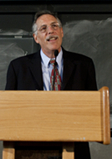 Peter Diamond is an Institute Professor Emeritus at MIT, where he taught from 1966 to 2011. He has written on public finance, social insurance, behavioral economics, uncertainty and search theories, and macroeconomics. His books include Saving Social Security: A Balanced Approach (with Peter R. Orszag), Reforming Pensions: Principles and Policy Choices and Pension Reform: A Short Guide (both with Nicholas Barr) and Behavioral Economics and Its Applications (edited with Hannu Vartiainen). Recent papers are “The Case for a Progressive Tax: From Basic Research to Policy Recommendations” (with Emmanuel Saez, JEP), “Cyclical Unemployment, Structural Unemployment” (IMF Economic Review) and “Shifts in the Beveridge Curve” (with Aysegul Şahin, RIE). He has been President of the American Economic Association, of the Econometric Society, and of the National Academy of Social Insurance. He was one of the three winners of the 2010 Sveriges Riksbank Prize in Economic Sciences in Memory of Alfred Nobel for analysis of markets with search frictions. Peter Diamond is an Institute Professor Emeritus at MIT, where he taught from 1966 to 2011. He has written on public finance, social insurance, behavioral economics, uncertainty and search theories, and macroeconomics. His books include Saving Social Security: A Balanced Approach (with Peter R. Orszag), Reforming Pensions: Principles and Policy Choices and Pension Reform: A Short Guide (both with Nicholas Barr) and Behavioral Economics and Its Applications (edited with Hannu Vartiainen). Recent papers are “The Case for a Progressive Tax: From Basic Research to Policy Recommendations” (with Emmanuel Saez, JEP), “Cyclical Unemployment, Structural Unemployment” (IMF Economic Review) and “Shifts in the Beveridge Curve” (with Aysegul Şahin, RIE). He has been President of the American Economic Association, of the Econometric Society, and of the National Academy of Social Insurance. He was one of the three winners of the 2010 Sveriges Riksbank Prize in Economic Sciences in Memory of Alfred Nobel for analysis of markets with search frictions.
Discussant: Betsey Stevenson (University of Michigan)  Betsey Stevenson is an Associate Professor of Economics and Public Policy at the Gerald R. Ford School of Public Policy at the University of Michigan. She is also a Research Associate with the National Bureau of Economic Research and a Fellow of the Ifo Institute for Economic Research in Munich. She has served as a Member of the Council of Economic Advisers from 2013 to 2015 and as the Chief Economist of the US Department of Labor from 2010 to 2011. She has held previous positions at Princeton University and at the University of Pennsylvania’s Wharton School. Dr Stevenson is a labor economist who has published widely in leading economics journals about the impact of public policies on the labor market, with a focus on women and families, and on the value of subjective well-being data for policy analysis. Her research explores women’s labor market experiences, the economic forces shaping the modern family, and how these labor market experiences and economic forces on the family influence each other. She is a columnist for Bloomberg View, and her thoughts on the economy are frequently covered in both print and television media. Dr Stevenson earned a B.A. in economics and mathematics from Wellesley College and an M.A. and Ph.D. in economics from Harvard University. Betsey Stevenson is an Associate Professor of Economics and Public Policy at the Gerald R. Ford School of Public Policy at the University of Michigan. She is also a Research Associate with the National Bureau of Economic Research and a Fellow of the Ifo Institute for Economic Research in Munich. She has served as a Member of the Council of Economic Advisers from 2013 to 2015 and as the Chief Economist of the US Department of Labor from 2010 to 2011. She has held previous positions at Princeton University and at the University of Pennsylvania’s Wharton School. Dr Stevenson is a labor economist who has published widely in leading economics journals about the impact of public policies on the labor market, with a focus on women and families, and on the value of subjective well-being data for policy analysis. Her research explores women’s labor market experiences, the economic forces shaping the modern family, and how these labor market experiences and economic forces on the family influence each other. She is a columnist for Bloomberg View, and her thoughts on the economy are frequently covered in both print and television media. Dr Stevenson earned a B.A. in economics and mathematics from Wellesley College and an M.A. and Ph.D. in economics from Harvard University.
European Unemployment Revisited: Shocks, Institutions, Integration
Paper | Presentation
Giuseppe Bertola (Università di Torino)
Presentation  Giuseppe Bertola (Ph.D., M.I.T., 1988) is Professore di Economia Politica, Università di Torino (Ordinario since 1996, previously Associato since 1993; on leave in 2011-2015 as Professor of Economics at EDHEC Business School and in 1997-2003 as Full-time professor at the European University Institute). In 1989-93 he was Assistant Professor and Assistant Director of the International Finance Section at Princeton University. Currently a member of the European Economic Advisory Group at CESifo (Munich), previously Condirettore of Giornale degli Economisti e Annali di Economia (1996-2012), Managing Editor of Economic Policy (2001-08), and a Programme Director of the Labour Economics programme at CEPR(2009-2013). He has performed scientific advisory work for the European Commission, the European Central Bank, and other organizations. His research is published in Review of Economic Studies, American Economic Review, European Economic Review, and other academic journals and books. He has authored chapters in Handbook of Labor Economics and Handbook of Income Distribution (North-Holland), coauthored Models for Dynamic Macroeconomics (Oxford University Press) and Income Distribution in Macroeconomic Models (Princeton University Press), and co-edited Welfare and Employment in a United Europe and The Economics of Consumer Credit (MIT Press). Giuseppe Bertola (Ph.D., M.I.T., 1988) is Professore di Economia Politica, Università di Torino (Ordinario since 1996, previously Associato since 1993; on leave in 2011-2015 as Professor of Economics at EDHEC Business School and in 1997-2003 as Full-time professor at the European University Institute). In 1989-93 he was Assistant Professor and Assistant Director of the International Finance Section at Princeton University. Currently a member of the European Economic Advisory Group at CESifo (Munich), previously Condirettore of Giornale degli Economisti e Annali di Economia (1996-2012), Managing Editor of Economic Policy (2001-08), and a Programme Director of the Labour Economics programme at CEPR(2009-2013). He has performed scientific advisory work for the European Commission, the European Central Bank, and other organizations. His research is published in Review of Economic Studies, American Economic Review, European Economic Review, and other academic journals and books. He has authored chapters in Handbook of Labor Economics and Handbook of Income Distribution (North-Holland), coauthored Models for Dynamic Macroeconomics (Oxford University Press) and Income Distribution in Macroeconomic Models (Princeton University Press), and co-edited Welfare and Employment in a United Europe and The Economics of Consumer Credit (MIT Press).
Discussant: Juan Francisco Jimeno (Banco de España)
Presentation  Juan F. Jimeno (Ph. D. in Economics, MIT, 1990) is head of the Macroeconomic Analysis and Modelling Division of Banco de España, where previously he was Head of the Research Division during 2004-2015. Previously, he was Professor of Economics at Universidad de Alcalá (Madrid), Senior Researcher at FEDEA, and Lecturer at the London School of Economics. He is also a Research Fellow of the Centre for Economic Policy Research (CEPR, London), of the Institute for the Study of Labor (IZA, Bonn), and editor of the IZA Journal of Labor Policy. He has published several books and book chapters and papers in academic and policy-oriented journals, mostly in applied macroeconomics and labour economics issues, such as Economic Growth and Aggregate Productivity; Prices, Business Fluctuations and Cycles; Consumption Saving, Production, Employment and Investment; Macroeconomic Aspects of Public Finance; Macroeconomic Policy and General Outlook, Wage and Employment Determination; Regional Labour Markets, Labour-Management Relations; Trade Unions and Collective Bargaining; Mobility, Unemployment and Vacancies; and Employment Policies. Juan F. Jimeno (Ph. D. in Economics, MIT, 1990) is head of the Macroeconomic Analysis and Modelling Division of Banco de España, where previously he was Head of the Research Division during 2004-2015. Previously, he was Professor of Economics at Universidad de Alcalá (Madrid), Senior Researcher at FEDEA, and Lecturer at the London School of Economics. He is also a Research Fellow of the Centre for Economic Policy Research (CEPR, London), of the Institute for the Study of Labor (IZA, Bonn), and editor of the IZA Journal of Labor Policy. He has published several books and book chapters and papers in academic and policy-oriented journals, mostly in applied macroeconomics and labour economics issues, such as Economic Growth and Aggregate Productivity; Prices, Business Fluctuations and Cycles; Consumption Saving, Production, Employment and Investment; Macroeconomic Aspects of Public Finance; Macroeconomic Policy and General Outlook, Wage and Employment Determination; Regional Labour Markets, Labour-Management Relations; Trade Unions and Collective Bargaining; Mobility, Unemployment and Vacancies; and Employment Policies.
|
| 3:45-4:00pm |
***Coffee Break*** |
| Economic Forum: Policy Challenges after the Great Recession |
| 4:00–5:30pm |
Video
Moderator: Maurice Obstfeld, Economic Counsellor and Director, Research Department, IMF  Maurice Obstfeld was born in New York City in 1952. Since September 2015, he has been the Economic Counsellor and Director of Research at the International Monetary Fund, on leave from the University of California, Berkeley. At Berkeley, he is the Class of 1958 Professor of Economics and formerly Chair of the Department of Economics (1998-2001). He arrived at Berkeley in 1991 as a professor, following permanent appointments at Columbia (1979-1986) and the University of Pennsylvania (1986-1989), and a visiting appointment at Harvard (1989-90). He received his Ph.D. in economics from MIT in 1979 after attending the University of Pennsylvania (B.A., 1973) and King’s College, Cambridge University (M.A., 1975). From July 2014 to August 2015, Dr. Obstfeld served as a Member of President Obama’s Council of Economic Advisers. He was previously (2002-2014) an honorary advisor to the Bank of Japan's Institute of Monetary and Economic Studies. He is a Fellow of the Econometric Society and the American Academy of Arts and Sciences. Among Dr. Obstfeld's honors are Tilburg University’s Tjalling Koopmans Asset Award, the John von Neumann Award of the Rajk Laszlo College of Advanced Studies (Budapest), and the Kiel Institute’s Bernhard Harms Prize. He has given a number distinguished lectures, including the American Economic Association’s annual Richard T. Ely Lecture, the L. K. Jha Memorial Lecture of the Reserve Bank of India, and the Frank Graham Memorial Lecture at Princeton. Dr. Obstfeld has served both on the Executive Committee and as Vice President of the American Economic Association. He has consulted and taught at the IMF and numerous central banks around the world. He is also the co-author of two leading textbooks on international economics, International Economics (10th edition, 2014, with Paul Krugman and Marc Melitz) and Foundations of International Macroeconomics (1996, with Kenneth Rogoff), as well as more than 100 research articles on exchange rates, international financial crises, global capital markets, and monetary policy. Maurice Obstfeld was born in New York City in 1952. Since September 2015, he has been the Economic Counsellor and Director of Research at the International Monetary Fund, on leave from the University of California, Berkeley. At Berkeley, he is the Class of 1958 Professor of Economics and formerly Chair of the Department of Economics (1998-2001). He arrived at Berkeley in 1991 as a professor, following permanent appointments at Columbia (1979-1986) and the University of Pennsylvania (1986-1989), and a visiting appointment at Harvard (1989-90). He received his Ph.D. in economics from MIT in 1979 after attending the University of Pennsylvania (B.A., 1973) and King’s College, Cambridge University (M.A., 1975). From July 2014 to August 2015, Dr. Obstfeld served as a Member of President Obama’s Council of Economic Advisers. He was previously (2002-2014) an honorary advisor to the Bank of Japan's Institute of Monetary and Economic Studies. He is a Fellow of the Econometric Society and the American Academy of Arts and Sciences. Among Dr. Obstfeld's honors are Tilburg University’s Tjalling Koopmans Asset Award, the John von Neumann Award of the Rajk Laszlo College of Advanced Studies (Budapest), and the Kiel Institute’s Bernhard Harms Prize. He has given a number distinguished lectures, including the American Economic Association’s annual Richard T. Ely Lecture, the L. K. Jha Memorial Lecture of the Reserve Bank of India, and the Frank Graham Memorial Lecture at Princeton. Dr. Obstfeld has served both on the Executive Committee and as Vice President of the American Economic Association. He has consulted and taught at the IMF and numerous central banks around the world. He is also the co-author of two leading textbooks on international economics, International Economics (10th edition, 2014, with Paul Krugman and Marc Melitz) and Foundations of International Macroeconomics (1996, with Kenneth Rogoff), as well as more than 100 research articles on exchange rates, international financial crises, global capital markets, and monetary policy.
Panelists:
- Olivier Blanchard (Peterson Institute)
Presentation
 Olivier Blanchard joined the Peterson Institute for International Economics as the first C. Fred Bergsten Senior Fellow in October 2015. A citizen of France, Blanchard has spent most of his professional life in Cambridge, MA. After obtaining his PhD in economics from the Massachusetts Institute of Technology (MIT) in 1977, he taught at Harvard University, and returned to MIT in 1982. He was chair of the economics department from 1998 to 2003. In 2008, he took a leave of absence to be the economic counselor and director of the Research Department at the International Monetary Fund. He remains Robert M. Solow Professor of Economics emeritus at MIT. Olivier Blanchard joined the Peterson Institute for International Economics as the first C. Fred Bergsten Senior Fellow in October 2015. A citizen of France, Blanchard has spent most of his professional life in Cambridge, MA. After obtaining his PhD in economics from the Massachusetts Institute of Technology (MIT) in 1977, he taught at Harvard University, and returned to MIT in 1982. He was chair of the economics department from 1998 to 2003. In 2008, he took a leave of absence to be the economic counselor and director of the Research Department at the International Monetary Fund. He remains Robert M. Solow Professor of Economics emeritus at MIT.
He is a macroeconomist, who has worked on a wide range of issues, from the role of monetary policy, the nature of speculative bubbles, the nature of the labor market and the determinants of unemployment, transition in former communist countries, and to forces behind the recent global financial crisis. In the process, he has worked with numerous countries and international organizations. He is the author of many books and articles, including two textbooks on macroeconomics, one at the graduate level with Stanley Fischer and the other at the undergraduate level. He is a past editor of the Quarterly Journal of Economics and the NBER Macroeconomics Annual and founding editor of American Economic Journal: Macroeconomics. He is a fellow and past council member of the Econometric Society, past vice president of the American Economic Association, and a member of the American Academy of Sciences.
- Stanley Fischer (Federal Reserve Board)
 Stanley Fischer took office as a member of the Board of Governors of the Federal Reserve System on May 28, 2014, to fill an unexpired term ending January 31, 2020. He was sworn in as Vice Chairman of the Board of Governors on June 16, 2014. His term as Vice Chairman expires on June 12, 2018. Prior to his appointment to the Board, Dr. Fischer was governor of the Bank of Israel from 2005 through 2013. From February 2002 to April 2005, Dr. Fischer was vice chairman of Citigroup. Dr. Fischer served as the first deputy managing director of the International Monetary Fund from September 1994 through August 2001. From January 1988 to August 1990, he was the chief economist of the World Bank. From 1977 to 1999, Dr. Fischer was a professor of economics at the Massachusetts Institute of Technology (MIT). From 1992 to 1995, he was the Elizabeth and James Killian Class of 1926 professor. From 1973 to 1977, Dr. Fischer was an associate professor of economics at MIT. Prior to joining the MIT faculty, Dr. Fischer was an assistant professor of economics and a postdoctoral fellow at the University of Chicago. Dr. Fischer has published many articles on a wide variety of economic issues, and he is the author and editor of several scholarly books. He has been a fellow at the Guggenheim Foundation, the American Academy of Arts and Sciences, and the Econometric Society, as well as a research associate at the National Bureau of Economic Research and an honorary fellow at the London School of Economics. Dr. Fischer was born in Lusaka, Zambia, in October 1943. He received his B.Sc. and M.Sc. in economics from the London School of Economics. He received his Ph.D. in economics from the Massachusetts Institute of Technology in 1969. Dr. Fischer is married with three adult children. Stanley Fischer took office as a member of the Board of Governors of the Federal Reserve System on May 28, 2014, to fill an unexpired term ending January 31, 2020. He was sworn in as Vice Chairman of the Board of Governors on June 16, 2014. His term as Vice Chairman expires on June 12, 2018. Prior to his appointment to the Board, Dr. Fischer was governor of the Bank of Israel from 2005 through 2013. From February 2002 to April 2005, Dr. Fischer was vice chairman of Citigroup. Dr. Fischer served as the first deputy managing director of the International Monetary Fund from September 1994 through August 2001. From January 1988 to August 1990, he was the chief economist of the World Bank. From 1977 to 1999, Dr. Fischer was a professor of economics at the Massachusetts Institute of Technology (MIT). From 1992 to 1995, he was the Elizabeth and James Killian Class of 1926 professor. From 1973 to 1977, Dr. Fischer was an associate professor of economics at MIT. Prior to joining the MIT faculty, Dr. Fischer was an assistant professor of economics and a postdoctoral fellow at the University of Chicago. Dr. Fischer has published many articles on a wide variety of economic issues, and he is the author and editor of several scholarly books. He has been a fellow at the Guggenheim Foundation, the American Academy of Arts and Sciences, and the Econometric Society, as well as a research associate at the National Bureau of Economic Research and an honorary fellow at the London School of Economics. Dr. Fischer was born in Lusaka, Zambia, in October 1943. He received his B.Sc. and M.Sc. in economics from the London School of Economics. He received his Ph.D. in economics from the Massachusetts Institute of Technology in 1969. Dr. Fischer is married with three adult children.
- Kristin Forbes (MIT and Bank of England)
Presentation
 Kristin Forbes joined the Monetary Policy Committee of the Bank of England in July of 2014. She is also the Jerome and Dorothy Lemelson Professor of Management and Global Economics at the Sloan School of Management at the Massachusetts Institute of Technology. This continues Professor Forbes tradition of serving in senior policy positions while maintaining her academic affiliation with MIT. She served as a Deputy Assistant Secretary in the U.S. Treasury Department from 2001-2002, as a Member of the White House’s Council of Economic Advisers from 2003-2005, and a Member of the Governor’s Council of Economic Advisers for Massachusetts from 2009-2014. Professor Forbes academic research addresses policy-related questions in international macroeconomics, including topics such as capital flows, contagion, and financial crises. Forbes was named a "Young Global Leader" as part of the World Economic Forum at Davos. She is a research associate at the NBER and a member of the Bellagio Group and Council on Foreign Relations. She was previously on the academic advisory board of the Congressional Budget Office, Peterson Institute for International Economics, and Center for Global Development. Before joining MIT, Forbes worked at the World Bank and Morgan Stanley. She received a PhD in Economics from MIT and her BA, summa cum laude with highest honors from Williams College. Kristin Forbes joined the Monetary Policy Committee of the Bank of England in July of 2014. She is also the Jerome and Dorothy Lemelson Professor of Management and Global Economics at the Sloan School of Management at the Massachusetts Institute of Technology. This continues Professor Forbes tradition of serving in senior policy positions while maintaining her academic affiliation with MIT. She served as a Deputy Assistant Secretary in the U.S. Treasury Department from 2001-2002, as a Member of the White House’s Council of Economic Advisers from 2003-2005, and a Member of the Governor’s Council of Economic Advisers for Massachusetts from 2009-2014. Professor Forbes academic research addresses policy-related questions in international macroeconomics, including topics such as capital flows, contagion, and financial crises. Forbes was named a "Young Global Leader" as part of the World Economic Forum at Davos. She is a research associate at the NBER and a member of the Bellagio Group and Council on Foreign Relations. She was previously on the academic advisory board of the Congressional Budget Office, Peterson Institute for International Economics, and Center for Global Development. Before joining MIT, Forbes worked at the World Bank and Morgan Stanley. She received a PhD in Economics from MIT and her BA, summa cum laude with highest honors from Williams College.
- Federico Sturzenegger (Central Bank of Argentina)
 Federico Sturzenegger Current President of Banco Central de la República Argentina, Federico Sturzenegger started his career in the public sphere as Secretary of Economic Policy of the Republic of Argentina, after which he served as President of Banco Ciudad of Buenos Aires, to finally become Congressman in the Chamber of Deputies. In the private area he excelled as Chief Economist for YPF, and consolidated his academic profile as Assistant Professor of Economics at UCLA, Professor and Dean of the Business School at the Universidad Torcuato Di Tella (UTDT), and Visiting Professor of Public Affairs at the John F. Kennedy School of Government at Harvard University. Well known for his books regarding economic issues as for his various academic papers on international finance and macroeconomic topics, Sturzenegger was chosen a Young Global Leader by the World Economic Forum and received the Konex award for his contribution to the economic theory.
He is an Economist from the Universidad Nacional de La Plata and has a Ph.D. in Economics from the Massachusetts Institute of Technology (MIT). Federico Sturzenegger Current President of Banco Central de la República Argentina, Federico Sturzenegger started his career in the public sphere as Secretary of Economic Policy of the Republic of Argentina, after which he served as President of Banco Ciudad of Buenos Aires, to finally become Congressman in the Chamber of Deputies. In the private area he excelled as Chief Economist for YPF, and consolidated his academic profile as Assistant Professor of Economics at UCLA, Professor and Dean of the Business School at the Universidad Torcuato Di Tella (UTDT), and Visiting Professor of Public Affairs at the John F. Kennedy School of Government at Harvard University. Well known for his books regarding economic issues as for his various academic papers on international finance and macroeconomic topics, Sturzenegger was chosen a Young Global Leader by the World Economic Forum and received the Konex award for his contribution to the economic theory.
He is an Economist from the Universidad Nacional de La Plata and has a Ph.D. in Economics from the Massachusetts Institute of Technology (MIT).
|



 Born in Paris in 1956, Christine Lagarde completed high school in Le Havre and attended Holton Arms School in Bethesda (Maryland, USA). She then graduated from law school at University Paris X, and obtained a Master’s degree from the Political Science Institute in Aix en Provence.
Born in Paris in 1956, Christine Lagarde completed high school in Le Havre and attended Holton Arms School in Bethesda (Maryland, USA). She then graduated from law school at University Paris X, and obtained a Master’s degree from the Political Science Institute in Aix en Provence. Mr. David Lipton assumed the position of First Deputy Managing Director of the International Monetary Fund since September 1, 2011. Before joining the Fund, he was Special Assistant to the President, and served as Senior Director for International Economic Affairs at the National Economic Council and National Security Council at the White House. Previously, Mr. Lipton was a Managing Director at Citi. Prior to joining Citi in May 2005, he was at Moore Capital Management for five years and, before that he spent a year at the Carnegie Endowment for International Peace. Mr. Lipton served in the Clinton administration at the Treasury Department from 1993 to 1998, including as Assistant Secretary and Under Secretary of the Treasury for International Affairs. Before that, he was a fellow at the Woodrow Wilson Center of Scholars. From 1989 to 1992, he worked as economic adviser to the governments of Russia, Poland and Slovenia. Mr. Lipton began his career with eight years on the IMF staff. He has a Ph.D. and M.A. from Harvard University in 1982 and a B.A. from Wesleyan University in 1975. Mr. Lipton is married to Susan Galbraith and has three children, Anna, Sasha, and Gabriel.
Mr. David Lipton assumed the position of First Deputy Managing Director of the International Monetary Fund since September 1, 2011. Before joining the Fund, he was Special Assistant to the President, and served as Senior Director for International Economic Affairs at the National Economic Council and National Security Council at the White House. Previously, Mr. Lipton was a Managing Director at Citi. Prior to joining Citi in May 2005, he was at Moore Capital Management for five years and, before that he spent a year at the Carnegie Endowment for International Peace. Mr. Lipton served in the Clinton administration at the Treasury Department from 1993 to 1998, including as Assistant Secretary and Under Secretary of the Treasury for International Affairs. Before that, he was a fellow at the Woodrow Wilson Center of Scholars. From 1989 to 1992, he worked as economic adviser to the governments of Russia, Poland and Slovenia. Mr. Lipton began his career with eight years on the IMF staff. He has a Ph.D. and M.A. from Harvard University in 1982 and a B.A. from Wesleyan University in 1975. Mr. Lipton is married to Susan Galbraith and has three children, Anna, Sasha, and Gabriel. Charles Wyplosz is Professor of International Economics at the Graduate Institute in Geneva where he is Director of the International Centre for Money and Banking Studies. His main research areas include financial crises, European monetary integration, fiscal policy and regional monetary integration. He is the co-author of two leading textbooks and has published several books and many professional articles. He has served as consultant to many international organizations and governments and is a frequent contributor to public media. A French national, Charles Wyplosz holds degrees in Engineering and Statistics from Paris and a PhD in Economics from Harvard University.
Charles Wyplosz is Professor of International Economics at the Graduate Institute in Geneva where he is Director of the International Centre for Money and Banking Studies. His main research areas include financial crises, European monetary integration, fiscal policy and regional monetary integration. He is the co-author of two leading textbooks and has published several books and many professional articles. He has served as consultant to many international organizations and governments and is a frequent contributor to public media. A French national, Charles Wyplosz holds degrees in Engineering and Statistics from Paris and a PhD in Economics from Harvard University. Jesper Lindé defended his PhD-thesis in empirical macroeconomics at the Stockholm School of Economics in 1999. Between 1999-2008 Lindé worked at Sveriges Riksbank, first as research economist and then as head of the modelling unit at the monetary policy department (2006-2008). In the fall of 2008, Lindé left Riksbank to take up a position as Section Chief in the Division of International Finance at the Board of Governors of the Federal Reserve System. In 2014, Lindé returned to Riksbank as Head of Research, a position he is currently on leave from to serve as resident scholar at the IMF. His main research interests are empirical and monetary macroeconomics, and he has recently published papers on the effects of fiscal policy in liquidity traps and currency unions in leading academic outlets like the American Economic Review, the Journal of the European Economic Association, the European Economic Review, and the NBER Macroeconomics Annual. Lindé is adjunct professor at the Stockholm School of Economics and research fellow at the Centre for Economic Policy Research (CEPR).
Jesper Lindé defended his PhD-thesis in empirical macroeconomics at the Stockholm School of Economics in 1999. Between 1999-2008 Lindé worked at Sveriges Riksbank, first as research economist and then as head of the modelling unit at the monetary policy department (2006-2008). In the fall of 2008, Lindé left Riksbank to take up a position as Section Chief in the Division of International Finance at the Board of Governors of the Federal Reserve System. In 2014, Lindé returned to Riksbank as Head of Research, a position he is currently on leave from to serve as resident scholar at the IMF. His main research interests are empirical and monetary macroeconomics, and he has recently published papers on the effects of fiscal policy in liquidity traps and currency unions in leading academic outlets like the American Economic Review, the Journal of the European Economic Association, the European Economic Review, and the NBER Macroeconomics Annual. Lindé is adjunct professor at the Stockholm School of Economics and research fellow at the Centre for Economic Policy Research (CEPR). Jeromin Zettelmeyer is Senior Fellow at the Peterson Institute for International Economics. Previously, he was Director-General for Economic Policy at the German Ministry for Economic Affairs (2014-16), Director of Research and Deputy Chief Economist of the European Bank for Reconstruction and Development (2008-2014) and a staff member in the Research, Western Hemisphere and European II departments of the International Monetary Fund (1994-2008). He has done research on sovereign debt, financial crises, growth, and transition to market, and policy work on transition economies, Latin America, the European Economic and Monetary Union, and Germany, where he coordinated a government effort to increase public and private investment. He is co-author of a book on sovereign debt crises and holds degrees from the University of Bonn (1990) and MIT (1995).
Jeromin Zettelmeyer is Senior Fellow at the Peterson Institute for International Economics. Previously, he was Director-General for Economic Policy at the German Ministry for Economic Affairs (2014-16), Director of Research and Deputy Chief Economist of the European Bank for Reconstruction and Development (2008-2014) and a staff member in the Research, Western Hemisphere and European II departments of the International Monetary Fund (1994-2008). He has done research on sovereign debt, financial crises, growth, and transition to market, and policy work on transition economies, Latin America, the European Economic and Monetary Union, and Germany, where he coordinated a government effort to increase public and private investment. He is co-author of a book on sovereign debt crises and holds degrees from the University of Bonn (1990) and MIT (1995). Athanasios Orphanides is a Professor of the Practice of Global Economics and Management at the MIT Sloan School of Management. Orphanides is also a Research Fellow of the Centre for Economic Policy Research, a Senior Fellow of the Center for Financial Studies, a Research Fellow of the Institute for Monetary and Financial Stability and a member of the Shadow Open Market Committee. His research interests are on central banking, finance, and political economy and he has published extensively on these topics. He has also contributed to the ongoing debate on the euro area crisis.
Athanasios Orphanides is a Professor of the Practice of Global Economics and Management at the MIT Sloan School of Management. Orphanides is also a Research Fellow of the Centre for Economic Policy Research, a Senior Fellow of the Center for Financial Studies, a Research Fellow of the Institute for Monetary and Financial Stability and a member of the Shadow Open Market Committee. His research interests are on central banking, finance, and political economy and he has published extensively on these topics. He has also contributed to the ongoing debate on the euro area crisis. Anil Kashyap is the Edward Eagle Brown Professor of Economics and Finance at the University of Chicago’s Booth School of Business. His research focuses on financial intermediation and regulation, the Japanese economy, price setting, and monetary policy. He is currently on leave at the Bank of England as a Senior Houblon Norman George fellow. He also serves as a consultant for the Federal Reserve Bank of Chicago and as a research associate for the National Bureau of Economic Research and is on the board of directors of the Bank of Italy’s Einuadi Institute of Economics and Finance. Kashyap is also one of the academic members of the Bellagio Group (whose non-academic members include the Deputy Central Bank Governors and Vice Ministers of Finance of the G7 countries). This experience, along with his research and other consulting and advising to central banks and finance ministries around the world, has helped him create two unique elective courses: “Understanding Central Banks” and “The Analytics of Financial Crises.”
Anil Kashyap is the Edward Eagle Brown Professor of Economics and Finance at the University of Chicago’s Booth School of Business. His research focuses on financial intermediation and regulation, the Japanese economy, price setting, and monetary policy. He is currently on leave at the Bank of England as a Senior Houblon Norman George fellow. He also serves as a consultant for the Federal Reserve Bank of Chicago and as a research associate for the National Bureau of Economic Research and is on the board of directors of the Bank of Italy’s Einuadi Institute of Economics and Finance. Kashyap is also one of the academic members of the Bellagio Group (whose non-academic members include the Deputy Central Bank Governors and Vice Ministers of Finance of the G7 countries). This experience, along with his research and other consulting and advising to central banks and finance ministries around the world, has helped him create two unique elective courses: “Understanding Central Banks” and “The Analytics of Financial Crises.”  Galina Hale (Borisova) is a Research Advisor at the Federal Reserve Bank of San Francisco, where she worked since 2006. Prior to her career at the Federal Reserve she was an assistant professor in the economics department of Yale University, where she taught international finance. She also taught a number of courses as a visiting faculty at Stanford and UC Berkeley. Galina began to study economics in Russia, first in Moscow State University economics department and then at the New Economic School's master's program. When in Russia, she briefly worked as a consultant for the Russian Ministry of Finance. She received her PhD in economics in 2002 from UC Berkeley, under the supervision of Barry Eichengreen. Galina's research interests lie in three main areas: understanding patterns of international capital flows and international financial crises, empirical analysis of corporate debt structure of private firms, and international banking. Galina has published her work in such journals as Journal of European Economic Association, Journal of International Economics, Journal of Financial Economics, Journal of Banking and Finance, IMF Economic Review, among others. She co-wrote with Cheryl Long a monograph “Foreign Direct Investment in China: Winners and Losers.”
Galina Hale (Borisova) is a Research Advisor at the Federal Reserve Bank of San Francisco, where she worked since 2006. Prior to her career at the Federal Reserve she was an assistant professor in the economics department of Yale University, where she taught international finance. She also taught a number of courses as a visiting faculty at Stanford and UC Berkeley. Galina began to study economics in Russia, first in Moscow State University economics department and then at the New Economic School's master's program. When in Russia, she briefly worked as a consultant for the Russian Ministry of Finance. She received her PhD in economics in 2002 from UC Berkeley, under the supervision of Barry Eichengreen. Galina's research interests lie in three main areas: understanding patterns of international capital flows and international financial crises, empirical analysis of corporate debt structure of private firms, and international banking. Galina has published her work in such journals as Journal of European Economic Association, Journal of International Economics, Journal of Financial Economics, Journal of Banking and Finance, IMF Economic Review, among others. She co-wrote with Cheryl Long a monograph “Foreign Direct Investment in China: Winners and Losers.” Poul Thomsen is the Director of the IMF’s European Department. He is currently in charge of the IMF’s programs with Greece and Portugal, and also oversees the work of other country teams, including Iceland, Romania, and Ukraine. During the 1990s and early 2000s, Thomsen gained extensive knowledge of the economic and social problems facing the countries in Central and Eastern Europe through multiple assignments in the region, including as the IMF’s Senior Resident Representative and Head of the Fund’s Moscow Office.
Poul Thomsen is the Director of the IMF’s European Department. He is currently in charge of the IMF’s programs with Greece and Portugal, and also oversees the work of other country teams, including Iceland, Romania, and Ukraine. During the 1990s and early 2000s, Thomsen gained extensive knowledge of the economic and social problems facing the countries in Central and Eastern Europe through multiple assignments in the region, including as the IMF’s Senior Resident Representative and Head of the Fund’s Moscow Office. Janice C. Eberly is the James R. and Helen D. Russell Professor of Finance and former Chair of the Finance Department. Eberly served as Assistant Secretary for Economic Policy at the U.S. Treasury in 2011-2013. She was Chief Economist at the Treasury, leading the Office of Economic Policy in analysis of the U.S. and global economies and development of policy recommendations on micro, macroeconomic and financial issues. Eberly’s research focuses on finance and macroeconomics, addressing firms’ capital budgeting decisions and household spending and portfolios. Her work has been published in the American Economic Review, Econometrica, and the Journal of Political Economy, among other academic journals. She received a Sloan Research Fellowship and was elected a fellow of the American Academy of Arts and Sciences in 2013. She serves as co-editor of the Brookings Papers on Economic Activity and is a non-resident Senior fellow of the Brookings Institution. She received her Ph.D. in economics from MIT.
Janice C. Eberly is the James R. and Helen D. Russell Professor of Finance and former Chair of the Finance Department. Eberly served as Assistant Secretary for Economic Policy at the U.S. Treasury in 2011-2013. She was Chief Economist at the Treasury, leading the Office of Economic Policy in analysis of the U.S. and global economies and development of policy recommendations on micro, macroeconomic and financial issues. Eberly’s research focuses on finance and macroeconomics, addressing firms’ capital budgeting decisions and household spending and portfolios. Her work has been published in the American Economic Review, Econometrica, and the Journal of Political Economy, among other academic journals. She received a Sloan Research Fellowship and was elected a fellow of the American Academy of Arts and Sciences in 2013. She serves as co-editor of the Brookings Papers on Economic Activity and is a non-resident Senior fellow of the Brookings Institution. She received her Ph.D. in economics from MIT.  Ricardo J. Caballero is the Ford International Professor of Economics, a director of the World Economic Laboratory at the Massachusetts Institute of Technology, and an NBER Research Associate. Caballero was the Chairman of MIT's Economics Department (2008-2011) and has been a visiting scholar and consultant at most major central banks and international financial institutions. His teaching and research fields are macroeconomics, international economics, and finance. His current research looks at global capital markets, speculative episodes and financial bubbles, systemic crises prevention mechanisms, and dynamic restructuring. His policy work focuses on aggregate risk management and insurance arrangements for emerging markets and developed economies. He has also written about aggregate consumption and investment, exchange rates, externalities, growth, price rigidity, dynamic aggregation, networks and complexity. Caballero has served on the editorial board of several academic journals and has a very extensive list of publications in all major academic journals. Among his major awards, he was the winner of the 2002 Frisch Medal of the Econometric Society for “Explaining Investment Dynamics in U.S. Manufacturing: A Generalized (S,s) Approach”, Econometrica, 67(4), July 1999 (joint work with Eduardo Engel); and both the Smith Breeden Prize by the American Finance Association and the Emerald Management Review Citation of Excellence Award for “Collective Risk Management in a Flight to Quality Episode”, Journal of Finance, 63(5), October 2008 (joint work with Arvind Krishnamurthy), Journal of Finance 2014 Brattle Group Prize for distinguished papers for “Fire Sales in a Model of Complexity,” joint with Alp Simsek. In April 1998, Caballero was elected a Fellow of the Econometric Society and subsequently of the American Academy of Arts and Sciences in April 2010.
Ricardo J. Caballero is the Ford International Professor of Economics, a director of the World Economic Laboratory at the Massachusetts Institute of Technology, and an NBER Research Associate. Caballero was the Chairman of MIT's Economics Department (2008-2011) and has been a visiting scholar and consultant at most major central banks and international financial institutions. His teaching and research fields are macroeconomics, international economics, and finance. His current research looks at global capital markets, speculative episodes and financial bubbles, systemic crises prevention mechanisms, and dynamic restructuring. His policy work focuses on aggregate risk management and insurance arrangements for emerging markets and developed economies. He has also written about aggregate consumption and investment, exchange rates, externalities, growth, price rigidity, dynamic aggregation, networks and complexity. Caballero has served on the editorial board of several academic journals and has a very extensive list of publications in all major academic journals. Among his major awards, he was the winner of the 2002 Frisch Medal of the Econometric Society for “Explaining Investment Dynamics in U.S. Manufacturing: A Generalized (S,s) Approach”, Econometrica, 67(4), July 1999 (joint work with Eduardo Engel); and both the Smith Breeden Prize by the American Finance Association and the Emerald Management Review Citation of Excellence Award for “Collective Risk Management in a Flight to Quality Episode”, Journal of Finance, 63(5), October 2008 (joint work with Arvind Krishnamurthy), Journal of Finance 2014 Brattle Group Prize for distinguished papers for “Fire Sales in a Model of Complexity,” joint with Alp Simsek. In April 1998, Caballero was elected a Fellow of the Econometric Society and subsequently of the American Academy of Arts and Sciences in April 2010. Romain Duval is an Advisor in the IMF Research Department, where he leads the agenda on structural reforms. Previously he was the Division Chief for Regional Studies of the Asia Pacific Department, where he was the editor of the Regional Economic Outlook for the region and in charge of the research on regional issues. Prior to joining the Fund he was Head of the Structural Surveillance Division at the OECD Economics Department, where he was the editor of the OECD flagship publication Going for Growth and also supervised a range of research projects. Earlier on, he headed a research unit and also served as an adviser to the OECD Chief Economist.
Romain Duval is an Advisor in the IMF Research Department, where he leads the agenda on structural reforms. Previously he was the Division Chief for Regional Studies of the Asia Pacific Department, where he was the editor of the Regional Economic Outlook for the region and in charge of the research on regional issues. Prior to joining the Fund he was Head of the Structural Surveillance Division at the OECD Economics Department, where he was the editor of the OECD flagship publication Going for Growth and also supervised a range of research projects. Earlier on, he headed a research unit and also served as an adviser to the OECD Chief Economist. Beth Anne Wilson is Senior Associate Director in the Division of International Finance of the Federal Reserve Board. At the Board, she has worked on a wide range of issues including U.S. labor markets, macroeconomic and financial developments in emerging market and advanced economies, international financial architecture and, currently, foreign financial markets and institutions and financial stability. Dr. Wilson has also served as senior economist for International Finance at the Council of Economic Advisers, Visiting Professor at Georgetown University, and a visitor at the Research Department of the International Monetary Fund. She has an active research agenda in areas including international business cycles and productivity and wage behavior. She received her PhD in Economics from the Massachusetts Institute of Technology and her Bachelor of Arts in Economics and in History from the University of California, Berkeley.
Beth Anne Wilson is Senior Associate Director in the Division of International Finance of the Federal Reserve Board. At the Board, she has worked on a wide range of issues including U.S. labor markets, macroeconomic and financial developments in emerging market and advanced economies, international financial architecture and, currently, foreign financial markets and institutions and financial stability. Dr. Wilson has also served as senior economist for International Finance at the Council of Economic Advisers, Visiting Professor at Georgetown University, and a visitor at the Research Department of the International Monetary Fund. She has an active research agenda in areas including international business cycles and productivity and wage behavior. She received her PhD in Economics from the Massachusetts Institute of Technology and her Bachelor of Arts in Economics and in History from the University of California, Berkeley. James Poterba is the Mitsui Professor of Economics at MIT and the President of the National Bureau of Economic Research. His research focuses on how taxation affects the economic decisions of households and firms, particularly those involving saving and portfolio behavior. His recent research has analyzed the determinants of retirement saving, the draw-down of assets after households reach retirement, and the role of tax-deferred retirement saving programs such as 401(k) plans in contributing to retirement security. He has served as President of the Eastern Economic Association and the National Tax Association, as vice president of the American Economic Association, and as a director of the American Finance Association. He is a member of the National Academy of Sciences, a fellow of the American Academy of Arts and Sciences and of the Econometric Society, and a trustee of the College Retirement Equity Fund (CREF) and the Alfred P. Sloan Foundation.
James Poterba is the Mitsui Professor of Economics at MIT and the President of the National Bureau of Economic Research. His research focuses on how taxation affects the economic decisions of households and firms, particularly those involving saving and portfolio behavior. His recent research has analyzed the determinants of retirement saving, the draw-down of assets after households reach retirement, and the role of tax-deferred retirement saving programs such as 401(k) plans in contributing to retirement security. He has served as President of the Eastern Economic Association and the National Tax Association, as vice president of the American Economic Association, and as a director of the American Finance Association. He is a member of the National Academy of Sciences, a fellow of the American Academy of Arts and Sciences and of the Econometric Society, and a trustee of the College Retirement Equity Fund (CREF) and the Alfred P. Sloan Foundation.  Hamid Faruqee is a senior staff member at the International Monetary Fund (IMF) where he joined in 1993. He currently serves as Assistant Director and head of the Regional Studies Division in the Fund’s Western Hemisphere Department—which produces the Regional Economic Outlook. He previously worked in the Research Department on G20 issues and served as chair of the taskforce producing the 2014 IMF Spillover Report. Hamid has also worked previously in the European Department, where he was heavily involved in the Multilateral Consultations on Global Imbalances, as well as Article IV surveillance for the euro area. Prior to joining the Fund, he was a lecturer at the Woodrow Wilson School of Public and International Affairs and received his Ph.D. in economics from Princeton University in 1994. Hamid was an editor for recent IMF books on Challenges for Central Banking: Perspectives from Latin America in 2016; and Global Rebalancing: A Roadmap for Economic Recovery in 2013. He (with Olivier Blanchard) also published a 2010 paper in Brookings Papers on Economic Activity investigating the effects of the crisis on emerging markets. Hamid has also been an active researcher and published many articles in academic journals in the area of exchange rate dynamics and pass-through.
Hamid Faruqee is a senior staff member at the International Monetary Fund (IMF) where he joined in 1993. He currently serves as Assistant Director and head of the Regional Studies Division in the Fund’s Western Hemisphere Department—which produces the Regional Economic Outlook. He previously worked in the Research Department on G20 issues and served as chair of the taskforce producing the 2014 IMF Spillover Report. Hamid has also worked previously in the European Department, where he was heavily involved in the Multilateral Consultations on Global Imbalances, as well as Article IV surveillance for the euro area. Prior to joining the Fund, he was a lecturer at the Woodrow Wilson School of Public and International Affairs and received his Ph.D. in economics from Princeton University in 1994. Hamid was an editor for recent IMF books on Challenges for Central Banking: Perspectives from Latin America in 2016; and Global Rebalancing: A Roadmap for Economic Recovery in 2013. He (with Olivier Blanchard) also published a 2010 paper in Brookings Papers on Economic Activity investigating the effects of the crisis on emerging markets. Hamid has also been an active researcher and published many articles in academic journals in the area of exchange rate dynamics and pass-through. Changyong Rhee assumed his current position as Director of the Asia and Pacific Department of the International Monetary Fund (IMF) in February 2014.Prior to coming to the Fund Dr. Rhee was chief economist at the Asian Development Bank (ADB). He was the chief spokesperson for ADB on economic and development trends, and oversaw the Economics and Research Department. Dr. Rhee was the secretary-general of the G20 summit’s Presidential Committee in the Republic of Korea. Prior to his appointment at the FSC, Dr. Rhee was a Professor of Economics at Seoul National University and Assistant Professor at University of Rochester. He was also a frequent and active policy advisor to the Government of Korea, including in the Office of the President, the Ministry of Finance and Economy, the Bank of Korea, the Korea Securities Depository, and the Korea Development Institute. His key research interests include macroeconomics, financial economics, and the Korean economy. He has published many papers in these fields. Dr. Rhee obtained his Ph.D. in Economics from Harvard University, and his Bachelor degree in Economics from Seoul National University.
Changyong Rhee assumed his current position as Director of the Asia and Pacific Department of the International Monetary Fund (IMF) in February 2014.Prior to coming to the Fund Dr. Rhee was chief economist at the Asian Development Bank (ADB). He was the chief spokesperson for ADB on economic and development trends, and oversaw the Economics and Research Department. Dr. Rhee was the secretary-general of the G20 summit’s Presidential Committee in the Republic of Korea. Prior to his appointment at the FSC, Dr. Rhee was a Professor of Economics at Seoul National University and Assistant Professor at University of Rochester. He was also a frequent and active policy advisor to the Government of Korea, including in the Office of the President, the Ministry of Finance and Economy, the Bank of Korea, the Korea Securities Depository, and the Korea Development Institute. His key research interests include macroeconomics, financial economics, and the Korean economy. He has published many papers in these fields. Dr. Rhee obtained his Ph.D. in Economics from Harvard University, and his Bachelor degree in Economics from Seoul National University. Suman Basu is an Economist in the Systemic Issues Division of the IMF Research Department. Suman obtained his B.A. in Economics from Cambridge University in 2003 and his Ph.D. in Economics from MIT in 2009. Within the IMF, he worked in the Asia-Pacific Department during 2011/2012, and he has contributed to the Vulnerability Exercise since 2012. His research focuses on sovereign debt and default, capital flows during crises, and economic unions.
Suman Basu is an Economist in the Systemic Issues Division of the IMF Research Department. Suman obtained his B.A. in Economics from Cambridge University in 2003 and his Ph.D. in Economics from MIT in 2009. Within the IMF, he worked in the Asia-Pacific Department during 2011/2012, and he has contributed to the Vulnerability Exercise since 2012. His research focuses on sovereign debt and default, capital flows during crises, and economic unions. Anton Korinek joined the Department of Economics at Johns Hopkins University in 2013 and is a Faculty Research Fellow at the NBER. He received his PhD from Columbia University in 2007 after three years of work experience in the financial sector. He has also worked at the University of Maryland and has been a visiting scholar at Harvard University, the World Bank, the IMF, the Bundesbank and the BIS.
His area of expertise is to study financial market imperfections, both in international capital markets and in domestic financial systems. His major contributions include a framework for regulating international capital flows to emerging economies that has been influential in both academic and policy circles; an analysis of macroprudential regulation to reduce crisis risk; the implications of financial regulation for inequality; the global spillover effects of national economic policies such as capital controls, and a theory of international policy cooperation. He has published in leading academic journals, such as the American Economic Review, the Journal of Monetary Economics and the Journal of International Economics. Korinek has also won several prestigious fellowships and awards for this work, including from the Institute for New Economic Thinking.
Anton Korinek joined the Department of Economics at Johns Hopkins University in 2013 and is a Faculty Research Fellow at the NBER. He received his PhD from Columbia University in 2007 after three years of work experience in the financial sector. He has also worked at the University of Maryland and has been a visiting scholar at Harvard University, the World Bank, the IMF, the Bundesbank and the BIS.
His area of expertise is to study financial market imperfections, both in international capital markets and in domestic financial systems. His major contributions include a framework for regulating international capital flows to emerging economies that has been influential in both academic and policy circles; an analysis of macroprudential regulation to reduce crisis risk; the implications of financial regulation for inequality; the global spillover effects of national economic policies such as capital controls, and a theory of international policy cooperation. He has published in leading academic journals, such as the American Economic Review, the Journal of Monetary Economics and the Journal of International Economics. Korinek has also won several prestigious fellowships and awards for this work, including from the Institute for New Economic Thinking.
 Gian Maria Milesi-Ferretti is Deputy Director in the Research Department of the International Monetary Fund. He is responsible for supervising the department work on multilateral surveillance, including the World Economic Outlook and the Spillover Report. He was previously a Deputy Director in the Western Hemisphere Department and IMF mission chief to the United States. He received his undergraduate degree in economics from Università di Roma La Sapienza in 1985 and his Ph.D. from Harvard in 1991. He joined the London School of Economics thereafter, and moved to the IMF in 1993. He has published extensively in refereed journals in the areas of international capital flows, international financial integration, current account sustainability, capital controls, taxation and growth, and political economy. His paper “The External Wealth of Nations Mark II” (joint with Philip Lane) recently won the Bhagwati award as best paper published in the Journal of International Economics during 2007-2008. Since 1996 he is a Research Fellow of the London-based Center for Economic Policy Research (CEPR).
Gian Maria Milesi-Ferretti is Deputy Director in the Research Department of the International Monetary Fund. He is responsible for supervising the department work on multilateral surveillance, including the World Economic Outlook and the Spillover Report. He was previously a Deputy Director in the Western Hemisphere Department and IMF mission chief to the United States. He received his undergraduate degree in economics from Università di Roma La Sapienza in 1985 and his Ph.D. from Harvard in 1991. He joined the London School of Economics thereafter, and moved to the IMF in 1993. He has published extensively in refereed journals in the areas of international capital flows, international financial integration, current account sustainability, capital controls, taxation and growth, and political economy. His paper “The External Wealth of Nations Mark II” (joint with Philip Lane) recently won the Bhagwati award as best paper published in the Journal of International Economics during 2007-2008. Since 1996 he is a Research Fellow of the London-based Center for Economic Policy Research (CEPR).  Linda Tesar is a Professor of Economics in the Department of Economics at the University of Michigan. She received her Ph.D. from the University of Rochester in 1990 and spent seven years on the faculty at the University of California in Santa Barbara. She joined the faculty at Michigan in 1997. She served as Department Chair from 2007 to 2011. Professor Tesar is a Research Associate at the National Bureau of Economic Research and has been a visitor in the Research Departments of the International Monetary Fund, the Board of Governors of the Federal Reserve System, and the Federal Reserve Bank in Minneapolis. She has also served on the Academic Advisory Council to the Federal Reserve Bank of Chicago. During 2014-15, Professor Tesar served as a Senior Economist on the Council of Economic Advisers. She is the incoming editor of the IMF Economic Review and on the Advisory Board of the Carnegie-NYU-Rochester Conference on Public Policy. Professor Tesar’s research focuses on issues in international finance, with particular interests in the international transmission of business cycles and fiscal policy, the benefits of global risksharing, capital flows to emerging markets, the impact of exchange rate exposure, international tax competition and the European debt crisis.
Linda Tesar is a Professor of Economics in the Department of Economics at the University of Michigan. She received her Ph.D. from the University of Rochester in 1990 and spent seven years on the faculty at the University of California in Santa Barbara. She joined the faculty at Michigan in 1997. She served as Department Chair from 2007 to 2011. Professor Tesar is a Research Associate at the National Bureau of Economic Research and has been a visitor in the Research Departments of the International Monetary Fund, the Board of Governors of the Federal Reserve System, and the Federal Reserve Bank in Minneapolis. She has also served on the Academic Advisory Council to the Federal Reserve Bank of Chicago. During 2014-15, Professor Tesar served as a Senior Economist on the Council of Economic Advisers. She is the incoming editor of the IMF Economic Review and on the Advisory Board of the Carnegie-NYU-Rochester Conference on Public Policy. Professor Tesar’s research focuses on issues in international finance, with particular interests in the international transmission of business cycles and fiscal policy, the benefits of global risksharing, capital flows to emerging markets, the impact of exchange rate exposure, international tax competition and the European debt crisis.  Lawrence H. Summers is the Charles W. Eliot University Professor and President Emeritus of Harvard University. During the past two decades, he has served in a series of senior policy positions in Washington, D.C., including the 71st Secretary of the Treasury for President Clinton, Director of the National Economic Council for President Obama and Vice President of Development Economics and Chief Economist of the World Bank. He received a bachelor of science degree from the Massachusetts Institute of Technology in 1975 and was awarded a Ph.D. from Harvard in 1982. In 1983, he became one of the youngest individuals in recent history to be named as a tenured member of the Harvard University faculty. In 1987, Mr. Summers became the first social scientist ever to receive the annual Alan T. Waterman Award of the National Science Foundation (NSF), and in 1993 he was awarded the John Bates Clark Medal, given every two years to the outstanding American economist under the age of 40. He is currently the Charles W. Eliot University Professor at Harvard University and the Weil Director of the Mossa¬var-Rahmani Center for Business & Government at Harvard’s Kennedy School. He and his wife Elisa New, a profes¬sor of English at Harvard, reside in Brookline with their six children.
Lawrence H. Summers is the Charles W. Eliot University Professor and President Emeritus of Harvard University. During the past two decades, he has served in a series of senior policy positions in Washington, D.C., including the 71st Secretary of the Treasury for President Clinton, Director of the National Economic Council for President Obama and Vice President of Development Economics and Chief Economist of the World Bank. He received a bachelor of science degree from the Massachusetts Institute of Technology in 1975 and was awarded a Ph.D. from Harvard in 1982. In 1983, he became one of the youngest individuals in recent history to be named as a tenured member of the Harvard University faculty. In 1987, Mr. Summers became the first social scientist ever to receive the annual Alan T. Waterman Award of the National Science Foundation (NSF), and in 1993 he was awarded the John Bates Clark Medal, given every two years to the outstanding American economist under the age of 40. He is currently the Charles W. Eliot University Professor at Harvard University and the Weil Director of the Mossa¬var-Rahmani Center for Business & Government at Harvard’s Kennedy School. He and his wife Elisa New, a profes¬sor of English at Harvard, reside in Brookline with their six children. Maurice Obstfeld was born in New York City in 1952. Since September 2015, he has been the Economic Counsellor and Director of Research at the International Monetary Fund, on leave from the University of California, Berkeley. At Berkeley, he is the Class of 1958 Professor of Economics and formerly Chair of the Department of Economics (1998-2001). He arrived at Berkeley in 1991 as a professor, following permanent appointments at Columbia (1979-1986) and the University of Pennsylvania (1986-1989), and a visiting appointment at Harvard (1989-90). He received his Ph.D. in economics from MIT in 1979 after attending the University of Pennsylvania (B.A., 1973) and King’s College, Cambridge University (M.A., 1975). From July 2014 to August 2015, Dr. Obstfeld served as a Member of President Obama’s Council of Economic Advisers. He was previously (2002-2014) an honorary advisor to the Bank of Japan's Institute of Monetary and Economic Studies. He is a Fellow of the Econometric Society and the American Academy of Arts and Sciences. Among Dr. Obstfeld's honors are Tilburg University’s Tjalling Koopmans Asset Award, the John von Neumann Award of the Rajk Laszlo College of Advanced Studies (Budapest), and the Kiel Institute’s Bernhard Harms Prize. He has given a number distinguished lectures, including the American Economic Association’s annual Richard T. Ely Lecture, the L. K. Jha Memorial Lecture of the Reserve Bank of India, and the Frank Graham Memorial Lecture at Princeton. Dr. Obstfeld has served both on the Executive Committee and as Vice President of the American Economic Association. He has consulted and taught at the IMF and numerous central banks around the world. He is also the co-author of two leading textbooks on international economics, International Economics (10th edition, 2014, with Paul Krugman and Marc Melitz) and Foundations of International Macroeconomics (1996, with Kenneth Rogoff), as well as more than 100 research articles on exchange rates, international financial crises, global capital markets, and monetary policy.
Maurice Obstfeld was born in New York City in 1952. Since September 2015, he has been the Economic Counsellor and Director of Research at the International Monetary Fund, on leave from the University of California, Berkeley. At Berkeley, he is the Class of 1958 Professor of Economics and formerly Chair of the Department of Economics (1998-2001). He arrived at Berkeley in 1991 as a professor, following permanent appointments at Columbia (1979-1986) and the University of Pennsylvania (1986-1989), and a visiting appointment at Harvard (1989-90). He received his Ph.D. in economics from MIT in 1979 after attending the University of Pennsylvania (B.A., 1973) and King’s College, Cambridge University (M.A., 1975). From July 2014 to August 2015, Dr. Obstfeld served as a Member of President Obama’s Council of Economic Advisers. He was previously (2002-2014) an honorary advisor to the Bank of Japan's Institute of Monetary and Economic Studies. He is a Fellow of the Econometric Society and the American Academy of Arts and Sciences. Among Dr. Obstfeld's honors are Tilburg University’s Tjalling Koopmans Asset Award, the John von Neumann Award of the Rajk Laszlo College of Advanced Studies (Budapest), and the Kiel Institute’s Bernhard Harms Prize. He has given a number distinguished lectures, including the American Economic Association’s annual Richard T. Ely Lecture, the L. K. Jha Memorial Lecture of the Reserve Bank of India, and the Frank Graham Memorial Lecture at Princeton. Dr. Obstfeld has served both on the Executive Committee and as Vice President of the American Economic Association. He has consulted and taught at the IMF and numerous central banks around the world. He is also the co-author of two leading textbooks on international economics, International Economics (10th edition, 2014, with Paul Krugman and Marc Melitz) and Foundations of International Macroeconomics (1996, with Kenneth Rogoff), as well as more than 100 research articles on exchange rates, international financial crises, global capital markets, and monetary policy.  Sharmini Coorey is the Director of the IMF’s Institute for Capacity Development. The Institute provides policy-oriented macroeconomics and finance training to government officials around the world. It also raises funding for the IMF’s technical assistance and training activities and manages their governance. Ms. Coorey was previously Deputy Director in the IMF’s African Department and headed the U.K./Nordic division in the IMF’s European Department. Her experience includes work on surveillance and IMF-supported programs in Europe, Asia, Africa, and North and South America, as well as on various IMF policy issues. She has served on the Editorial Committee of IMF Staff Papers and been a visiting researcher at George Washington University’s Elliott School of International Affairs. Ms. Coorey holds Ph.D. and A.B. degrees in Economics from Harvard University. She has published papers on inflation and economic growth in transition and developing countries and edited a book on managing Central Africa’s oil wealth.
Sharmini Coorey is the Director of the IMF’s Institute for Capacity Development. The Institute provides policy-oriented macroeconomics and finance training to government officials around the world. It also raises funding for the IMF’s technical assistance and training activities and manages their governance. Ms. Coorey was previously Deputy Director in the IMF’s African Department and headed the U.K./Nordic division in the IMF’s European Department. Her experience includes work on surveillance and IMF-supported programs in Europe, Asia, Africa, and North and South America, as well as on various IMF policy issues. She has served on the Editorial Committee of IMF Staff Papers and been a visiting researcher at George Washington University’s Elliott School of International Affairs. Ms. Coorey holds Ph.D. and A.B. degrees in Economics from Harvard University. She has published papers on inflation and economic growth in transition and developing countries and edited a book on managing Central Africa’s oil wealth. Giovanni Dell'Ariccia is Deputy Director of the Research Department where he supervises the activities of the Macro-Financial Division. Previously he worked in the Asia and Pacific Department. His research interests include: Banking; the Macroeconomics of Credit; Monetary Policy; International Finance; and Conditionality in International Lending and Aid Programs. His papers have been published on major economics and finance journals. Mr. Dell’Ariccia holds a Ph.D. from MIT and a Bachelor degree from the University of Rome. He is a CEPR Research Fellow.
Giovanni Dell'Ariccia is Deputy Director of the Research Department where he supervises the activities of the Macro-Financial Division. Previously he worked in the Asia and Pacific Department. His research interests include: Banking; the Macroeconomics of Credit; Monetary Policy; International Finance; and Conditionality in International Lending and Aid Programs. His papers have been published on major economics and finance journals. Mr. Dell’Ariccia holds a Ph.D. from MIT and a Bachelor degree from the University of Rome. He is a CEPR Research Fellow. Trish Mosser is a Senior Research Scholar and Senior Fellow at SIPA and the founding director of a new SIPA initiative on central banking, monetary policy and prudential oversight. Previously, Mosser was Deputy Director and head of Research and Analysis for the Office of Financial Research (OFR) at U.S. Department of Treasury, overseeing an interdisciplinary team of researchers working on a variety of financial stability topics. Mosser spent over 20 years at the Federal Reserve Bank of New York as both a researcher and monetary policy practitioner. She was a senior manager in the Markets Group at the New York Fed, where she was responsible for financial market analysis, monetary policy implementation including many crisis-related facilities, foreign exchange operations, and analysis of financial stability and financial reform issues post crisis. Previously she had served as an economist in the New York Fed Research Department, managing both the Macroeconomics and Capital Markets research areas, and she was an Assistant Professor in the Economics Department at Columbia. She has written extensively on monetary policy and financial stability topics including financial crisis policy tools, financial structure and the monetary policy transmission mechanism, financial reform post crisis and housing finance reform. Mosser serves on the Bank of England’s Macro Prudential Advisory Committee and has served as a member of the Deputies Committee of the Financial Stability Oversight Council (FSOC), on the Board of the American Economic Association’s Committee on the Status of Women in the Economics Profession (CSWEP) and on numerous international central banking and financial policy committees.
Trish Mosser is a Senior Research Scholar and Senior Fellow at SIPA and the founding director of a new SIPA initiative on central banking, monetary policy and prudential oversight. Previously, Mosser was Deputy Director and head of Research and Analysis for the Office of Financial Research (OFR) at U.S. Department of Treasury, overseeing an interdisciplinary team of researchers working on a variety of financial stability topics. Mosser spent over 20 years at the Federal Reserve Bank of New York as both a researcher and monetary policy practitioner. She was a senior manager in the Markets Group at the New York Fed, where she was responsible for financial market analysis, monetary policy implementation including many crisis-related facilities, foreign exchange operations, and analysis of financial stability and financial reform issues post crisis. Previously she had served as an economist in the New York Fed Research Department, managing both the Macroeconomics and Capital Markets research areas, and she was an Assistant Professor in the Economics Department at Columbia. She has written extensively on monetary policy and financial stability topics including financial crisis policy tools, financial structure and the monetary policy transmission mechanism, financial reform post crisis and housing finance reform. Mosser serves on the Bank of England’s Macro Prudential Advisory Committee and has served as a member of the Deputies Committee of the Financial Stability Oversight Council (FSOC), on the Board of the American Economic Association’s Committee on the Status of Women in the Economics Profession (CSWEP) and on numerous international central banking and financial policy committees.  Guido Lorenzoni is the Breen Family Professor of Economics at Northwestern University. He is currently on leave at Chicago Booth as the Ford Foundation visiting scholar. He is also a Research Associate for the National Bureau of Economic Research and a consultant for the Federal Reserve Bank of Chicago. His research focuses on the role of expectations in economic fluctuations and on the interaction between financial markets and aggregate economic activity. He holds a bachelor degree from the University of Rome and a PhD from MIT. Before joining Northwestern in 2012 he held positions at MIT and Princeton. He is a foreign editor for the Review of Economic Studies and an associate editor for the Journal of Economic Perspectives. He received the Alfred P. Sloan Research Fellowship in 2009.
Guido Lorenzoni is the Breen Family Professor of Economics at Northwestern University. He is currently on leave at Chicago Booth as the Ford Foundation visiting scholar. He is also a Research Associate for the National Bureau of Economic Research and a consultant for the Federal Reserve Bank of Chicago. His research focuses on the role of expectations in economic fluctuations and on the interaction between financial markets and aggregate economic activity. He holds a bachelor degree from the University of Rome and a PhD from MIT. Before joining Northwestern in 2012 he held positions at MIT and Princeton. He is a foreign editor for the Review of Economic Studies and an associate editor for the Journal of Economic Perspectives. He received the Alfred P. Sloan Research Fellowship in 2009. Olivier Jeanne is a Professor of Economics at Johns Hopkins University, which he joined in 2008 after ten years at the Research Department of the International Monetary Fund. His research spans an array of applied and theoretical topics in international and domestic macroeconomics: capital flows, exchange rate regimes and currency crises, sovereign debt and defaults, international liquidity, and monetary policy. Olivier Jeanne is a Senior Fellow at the Peterson Institute for International Economics (Washinton DC), a Research Associate at the National Bureau of Economic Research (NBER), and a Research Fellow at the Center for Economic Policy Research (CEPR). He graduated from Ecole Polytechnique and Ecole Nationale des Ponts et Chaussées in France, holds a MsC in Economics from the London School of Economics and a PhD in Economics from Ecole des Hautes Etudes en Sciences Sociales (EHESS, Paris). Before joining Johns Hopkins University, he taught economics at Ecole Polytechnique, UC Berkeley and Princeton University.
Olivier Jeanne is a Professor of Economics at Johns Hopkins University, which he joined in 2008 after ten years at the Research Department of the International Monetary Fund. His research spans an array of applied and theoretical topics in international and domestic macroeconomics: capital flows, exchange rate regimes and currency crises, sovereign debt and defaults, international liquidity, and monetary policy. Olivier Jeanne is a Senior Fellow at the Peterson Institute for International Economics (Washinton DC), a Research Associate at the National Bureau of Economic Research (NBER), and a Research Fellow at the Center for Economic Policy Research (CEPR). He graduated from Ecole Polytechnique and Ecole Nationale des Ponts et Chaussées in France, holds a MsC in Economics from the London School of Economics and a PhD in Economics from Ecole des Hautes Etudes en Sciences Sociales (EHESS, Paris). Before joining Johns Hopkins University, he taught economics at Ecole Polytechnique, UC Berkeley and Princeton University. Vitor Gaspar, a Portuguese national, is Director of the Fiscal Affairs Department of the International Monetary Fund. Prior to joining the IMF, he held a variety of senior policy positions in Banco de Portugal, including most recently as Special Adviser. He served as Minister of State and Finance of Portugal during 2011-2013. He was head of the European Commission’s Bureau of European Policy Advisers during 2007-2010 and director-general of research at the European Central Bank from 1998 to 2004. Mr. Gaspar holds a Ph.D. and a post-doctoral agregado in Economics from Universidade Nova de Lisboa; he also studied at Universidade Católica Portuguesa.
Vitor Gaspar, a Portuguese national, is Director of the Fiscal Affairs Department of the International Monetary Fund. Prior to joining the IMF, he held a variety of senior policy positions in Banco de Portugal, including most recently as Special Adviser. He served as Minister of State and Finance of Portugal during 2011-2013. He was head of the European Commission’s Bureau of European Policy Advisers during 2007-2010 and director-general of research at the European Central Bank from 1998 to 2004. Mr. Gaspar holds a Ph.D. and a post-doctoral agregado in Economics from Universidade Nova de Lisboa; he also studied at Universidade Católica Portuguesa. Francesco Giavazzi (Bergamo Italy, 1949), Professor of Economics (Bocconi University, Milan), current Vice Chairman of the International Advisory Council, was also deputy rector (2000–02) of University research activities. Visiting Professor at MIT (2003–13). 1972 Electrical Engineering Degree (Politecnico di Milano), in 1978 obtains a PhD in Economics (MIT). CEPR research fellow and former trustee, NBER research associate, Scientific Committee Chair (CEPII), Bellagio Group member. In 1991, Giavazzi contributed to founding IGIER (economic research institute jointly created by NBER, CEPR, Bocconi University) and served as the first Director and President until 2002. 2012 Adviser Italian government Spending Review; 2013 Adviser Federal Reserve Bank of New York. Member (1998–2000) of Group of Economic Advisers to the Italian Prime Minister; and (2000–10) of Group of Economic Advisers to the President of the European Commission. 1994, Houblon-Norman Fellow (Bank of England), 1999 External Evaluation Committee Member IMF Research Activities. Jointly (with Prof. Fredrick Mishkin) conducts the 2006 Riksbank Evaluation for the Swedish Parliament. 1992-1994 Italian Treasury Director General, serving the Treasury as Board Deputy Chairman of INA s.p.a., Assitalia s.p.a. and Banco di Napoli s.p.a. Current independent director of Vitale&Associati S.p.A. His first book Limiting Exchange Rate Flexibity was published in 1989, with Alberto Giovannini (MIT Press) and in 2006 The Future of Europe: Reform or Decline, with Alberto Alesina.
Francesco Giavazzi (Bergamo Italy, 1949), Professor of Economics (Bocconi University, Milan), current Vice Chairman of the International Advisory Council, was also deputy rector (2000–02) of University research activities. Visiting Professor at MIT (2003–13). 1972 Electrical Engineering Degree (Politecnico di Milano), in 1978 obtains a PhD in Economics (MIT). CEPR research fellow and former trustee, NBER research associate, Scientific Committee Chair (CEPII), Bellagio Group member. In 1991, Giavazzi contributed to founding IGIER (economic research institute jointly created by NBER, CEPR, Bocconi University) and served as the first Director and President until 2002. 2012 Adviser Italian government Spending Review; 2013 Adviser Federal Reserve Bank of New York. Member (1998–2000) of Group of Economic Advisers to the Italian Prime Minister; and (2000–10) of Group of Economic Advisers to the President of the European Commission. 1994, Houblon-Norman Fellow (Bank of England), 1999 External Evaluation Committee Member IMF Research Activities. Jointly (with Prof. Fredrick Mishkin) conducts the 2006 Riksbank Evaluation for the Swedish Parliament. 1992-1994 Italian Treasury Director General, serving the Treasury as Board Deputy Chairman of INA s.p.a., Assitalia s.p.a. and Banco di Napoli s.p.a. Current independent director of Vitale&Associati S.p.A. His first book Limiting Exchange Rate Flexibity was published in 1989, with Alberto Giovannini (MIT Press) and in 2006 The Future of Europe: Reform or Decline, with Alberto Alesina. Christopher Erceg is currently a senior associate director in the Federal Reserve Board’s International Finance (IF) Division, where he has worked as an economist since 1993. Chris began his career at the Board with a focus on emerging market economies, including on the challenges posed by the debt crises in Latin America and Asia in the 1990s. He later played a major role in developing the Federal Reserve Board’s global macroeconomic models and in applying them to policy issues. His research interests include monetary and fiscal policy, open economy macroeconomics, and commodity price behavior. Over his career, he has published papers in many leading journals, including the American Economic Review, the Journal of Monetary Economics, the Journal of International Economics and the Journal of the European Economic Association. He served as a Senior Research Fellow in the IMF’s Research Department in 2012-2013, and also as an adjunct professor at Columbia University, Georgetown University, and Johns Hopkins University. Chris received his B.A. from the University of Virginia, and his Ph.D. in economics from the University of Chicago
Christopher Erceg is currently a senior associate director in the Federal Reserve Board’s International Finance (IF) Division, where he has worked as an economist since 1993. Chris began his career at the Board with a focus on emerging market economies, including on the challenges posed by the debt crises in Latin America and Asia in the 1990s. He later played a major role in developing the Federal Reserve Board’s global macroeconomic models and in applying them to policy issues. His research interests include monetary and fiscal policy, open economy macroeconomics, and commodity price behavior. Over his career, he has published papers in many leading journals, including the American Economic Review, the Journal of Monetary Economics, the Journal of International Economics and the Journal of the European Economic Association. He served as a Senior Research Fellow in the IMF’s Research Department in 2012-2013, and also as an adjunct professor at Columbia University, Georgetown University, and Johns Hopkins University. Chris received his B.A. from the University of Virginia, and his Ph.D. in economics from the University of Chicago Thomas Philippon is Professor of Finance at New York University, Stern School of Business. Philippon was named one of the “top 25 economists under 45” by the IMF in 2014. He also won the 2013 Bernácer Prize for Best European Economist under 40, the 2010 Michael Brennan & BlackRock Award, the 2009 Prize for Best Young French Economist, and the 2008 Brattle Prize for the best paper in Corporate Finance. He was elected Global Economic Fellow in 2009 by the Kiel Institute for the World Economy. Philippon has studied various topics in macroeconomics and finance: systemic risk, crisis resolution mechanisms, the dynamics of corporate investment and household debt, and the size of the finance industry. His recent work has focused on the Eurozone crisis and on financial regulation. He currently serves on the Monetary Policy Advisory Panel of the Federal Reserve Bank of New York, and as a board member and director of the scientific committee of ACPR, the French prudential regulator of banks and insurance companies. From 2012 to 2013, he was the Senior Economic Advisor to the French Finance Minister. Philippon graduated from Ecole Polytechnique, received a PhD in Economics from MIT, and joined New York University in 2003.
Thomas Philippon is Professor of Finance at New York University, Stern School of Business. Philippon was named one of the “top 25 economists under 45” by the IMF in 2014. He also won the 2013 Bernácer Prize for Best European Economist under 40, the 2010 Michael Brennan & BlackRock Award, the 2009 Prize for Best Young French Economist, and the 2008 Brattle Prize for the best paper in Corporate Finance. He was elected Global Economic Fellow in 2009 by the Kiel Institute for the World Economy. Philippon has studied various topics in macroeconomics and finance: systemic risk, crisis resolution mechanisms, the dynamics of corporate investment and household debt, and the size of the finance industry. His recent work has focused on the Eurozone crisis and on financial regulation. He currently serves on the Monetary Policy Advisory Panel of the Federal Reserve Bank of New York, and as a board member and director of the scientific committee of ACPR, the French prudential regulator of banks and insurance companies. From 2012 to 2013, he was the Senior Economic Advisor to the French Finance Minister. Philippon graduated from Ecole Polytechnique, received a PhD in Economics from MIT, and joined New York University in 2003. Marcos Chamon is a Deputy Division Chief in the Western Hemisphere Department of the International Monetary Fund, and the mission chief for Guyana. He has worked on a wide range of topics related to international finance, including problems related to sovereign debt restructuring, debt composition and liability denomination, currency mismatches, indexation of debt to GDP, the international financial architecture, country insurance, methodologies to assess vulnerabilities in emerging markets and advanced economies, consumption and savings in China, post-reform growth in Latin America, political economy and distributional implications of exchange rate movements, the emerging markets’ policy responses to the Global Financial Crisis, the design of capital controls and macro prudential policies, and monetary policy and foreign exchange intervention in emerging markets. He was a visiting professor at PUC-Rio in the Fall of 2007. Prior to joining the IMF, he obtained his Ph.D. in Economics from Harvard University in 2003.
Marcos Chamon is a Deputy Division Chief in the Western Hemisphere Department of the International Monetary Fund, and the mission chief for Guyana. He has worked on a wide range of topics related to international finance, including problems related to sovereign debt restructuring, debt composition and liability denomination, currency mismatches, indexation of debt to GDP, the international financial architecture, country insurance, methodologies to assess vulnerabilities in emerging markets and advanced economies, consumption and savings in China, post-reform growth in Latin America, political economy and distributional implications of exchange rate movements, the emerging markets’ policy responses to the Global Financial Crisis, the design of capital controls and macro prudential policies, and monetary policy and foreign exchange intervention in emerging markets. He was a visiting professor at PUC-Rio in the Fall of 2007. Prior to joining the IMF, he obtained his Ph.D. in Economics from Harvard University in 2003. Adam Posen is President of the Peterson Institute for International Economics, the world's leading independent think tank on economics and globalization. He is one of the world's foremost experts on macroeconomic policy, resolution of financial crises, the economies of Europe, Japan, and the US, and central banking issues. The Winter 2013 issue of The International Economy (TIE) magazine features an in-depth interview with Peterson Institute President Adam S. Posen. From September 2009, by appointment of the UK Chancellor of the Exchequer, Dr. Posen served for three years as an external member of the Bank of England's rate-setting Monetary Policy Committee. During this critical period for the world economy, he was a prominent advocate of activist policy response to the financial crisis, successfully led the MPC into quantitative easing, brought innovative efforts to stimulate business investment to the top of the UK economic agenda, and accurately forecast global inflation developments. Adam Posen brings a uniquely international perspective to macroeconomics: He worked in finance in Germany following reunification; wrote the definitive book on Japan's economic crisis of the 1990s and counseled the Koizumi government that subsequently turned Japan around; coauthored with Ben Bernanke a reform program for Fed policy, and currently advises the US Congressional Budget Office; and consulted for the UK Cabinet Office on the successful London G-20 summit of 2009, prior to being appointed to the MPC. Among the most cited economists in the press, he appears frequently on Bloomberg, CNBC, BBC, and NPR programs, and his commentary is published regularly in the world's leading newspapers. In April 2012, an article in the Atlantic magazine named Dr. Posen to its international team of "superstar central bankers," and in December 2012 he was profiled in the New York Times Magazine article "God Save the British Economy." Dr. Posen received his PhD and BA from Harvard University and is a member of the Council on Foreign Relations, of the Trilateral Commission, and of the faculty of the World Economic Forum. The author or editor of five books, he has been the recipient of major grants and research fellowships from the American Academy in Berlin, the Bank of England, the Brookings Institution, the European Commission, the Ford Foundation, the Sloan Foundation, and the US National Science Foundation.
Adam Posen is President of the Peterson Institute for International Economics, the world's leading independent think tank on economics and globalization. He is one of the world's foremost experts on macroeconomic policy, resolution of financial crises, the economies of Europe, Japan, and the US, and central banking issues. The Winter 2013 issue of The International Economy (TIE) magazine features an in-depth interview with Peterson Institute President Adam S. Posen. From September 2009, by appointment of the UK Chancellor of the Exchequer, Dr. Posen served for three years as an external member of the Bank of England's rate-setting Monetary Policy Committee. During this critical period for the world economy, he was a prominent advocate of activist policy response to the financial crisis, successfully led the MPC into quantitative easing, brought innovative efforts to stimulate business investment to the top of the UK economic agenda, and accurately forecast global inflation developments. Adam Posen brings a uniquely international perspective to macroeconomics: He worked in finance in Germany following reunification; wrote the definitive book on Japan's economic crisis of the 1990s and counseled the Koizumi government that subsequently turned Japan around; coauthored with Ben Bernanke a reform program for Fed policy, and currently advises the US Congressional Budget Office; and consulted for the UK Cabinet Office on the successful London G-20 summit of 2009, prior to being appointed to the MPC. Among the most cited economists in the press, he appears frequently on Bloomberg, CNBC, BBC, and NPR programs, and his commentary is published regularly in the world's leading newspapers. In April 2012, an article in the Atlantic magazine named Dr. Posen to its international team of "superstar central bankers," and in December 2012 he was profiled in the New York Times Magazine article "God Save the British Economy." Dr. Posen received his PhD and BA from Harvard University and is a member of the Council on Foreign Relations, of the Trilateral Commission, and of the faculty of the World Economic Forum. The author or editor of five books, he has been the recipient of major grants and research fellowships from the American Academy in Berlin, the Bank of England, the Brookings Institution, the European Commission, the Ford Foundation, the Sloan Foundation, and the US National Science Foundation. George Akerlof is University Professor at Georgetown. His research is based in economics, but it often draws from other disciplines, including psychology, anthropology, and sociology. He played an important role in the development of behavioral economics. In 2001, he was co-recipient of the Nobel Prize in Economic Sciences, along with Michael Spence and Joseph Stiglitz. The Nobel Committee cited Akerlof’s 1970 paper, “The Market for ‘Lemons,’” which for the first time described the role of asymmetric information in causing market perversity. A vicious circle in used car markets illustrates the phenomenon. Potential sellers of used cars, with their superior information, withhold good cars from the market; buyers react by reducing the price they are willing to pay; and in turn sellers further reduce the quality of cars put up for sale. In 2009, Professor Akerlof published Animal Spirits, with Robert Shiller; and in 2010, Identity Economics, with Rachel Kranton, He is currently working on a new book, again with Shiller, with the title Phishing for Phools. Prior to joining Georgetown, Professor Akerlof taught, with only brief interruption, at the University of California at Berkeley from 1966 to 2010. He was Visiting Scholar at the IMF from 2010 to 2014. He has been senior economist at the President’s Council of Economic Advisers, and past president, vice president and member of the executive committee of the American Economics Association, and member of the Council of the Econometric Society. He is a trustee of Economists for Peace and Security, and co-director of the Social Interactions, Identity and Well-Being program of the Canadian Institute for Advanced Research. He was Cassell Professor of Economics at the London School of Economics from 1978 to 2010.
George Akerlof is University Professor at Georgetown. His research is based in economics, but it often draws from other disciplines, including psychology, anthropology, and sociology. He played an important role in the development of behavioral economics. In 2001, he was co-recipient of the Nobel Prize in Economic Sciences, along with Michael Spence and Joseph Stiglitz. The Nobel Committee cited Akerlof’s 1970 paper, “The Market for ‘Lemons,’” which for the first time described the role of asymmetric information in causing market perversity. A vicious circle in used car markets illustrates the phenomenon. Potential sellers of used cars, with their superior information, withhold good cars from the market; buyers react by reducing the price they are willing to pay; and in turn sellers further reduce the quality of cars put up for sale. In 2009, Professor Akerlof published Animal Spirits, with Robert Shiller; and in 2010, Identity Economics, with Rachel Kranton, He is currently working on a new book, again with Shiller, with the title Phishing for Phools. Prior to joining Georgetown, Professor Akerlof taught, with only brief interruption, at the University of California at Berkeley from 1966 to 2010. He was Visiting Scholar at the IMF from 2010 to 2014. He has been senior economist at the President’s Council of Economic Advisers, and past president, vice president and member of the executive committee of the American Economics Association, and member of the Council of the Econometric Society. He is a trustee of Economists for Peace and Security, and co-director of the Social Interactions, Identity and Well-Being program of the Canadian Institute for Advanced Research. He was Cassell Professor of Economics at the London School of Economics from 1978 to 2010. Peter Diamond is an Institute Professor Emeritus at MIT, where he taught from 1966 to 2011. He has written on public finance, social insurance, behavioral economics, uncertainty and search theories, and macroeconomics. His books include Saving Social Security: A Balanced Approach (with Peter R. Orszag), Reforming Pensions: Principles and Policy Choices and Pension Reform: A Short Guide (both with Nicholas Barr) and Behavioral Economics and Its Applications (edited with Hannu Vartiainen). Recent papers are “The Case for a Progressive Tax: From Basic Research to Policy Recommendations” (with Emmanuel Saez, JEP), “Cyclical Unemployment, Structural Unemployment” (IMF Economic Review) and “Shifts in the Beveridge Curve” (with Aysegul Şahin, RIE). He has been President of the American Economic Association, of the Econometric Society, and of the National Academy of Social Insurance. He was one of the three winners of the 2010 Sveriges Riksbank Prize in Economic Sciences in Memory of Alfred Nobel for analysis of markets with search frictions.
Peter Diamond is an Institute Professor Emeritus at MIT, where he taught from 1966 to 2011. He has written on public finance, social insurance, behavioral economics, uncertainty and search theories, and macroeconomics. His books include Saving Social Security: A Balanced Approach (with Peter R. Orszag), Reforming Pensions: Principles and Policy Choices and Pension Reform: A Short Guide (both with Nicholas Barr) and Behavioral Economics and Its Applications (edited with Hannu Vartiainen). Recent papers are “The Case for a Progressive Tax: From Basic Research to Policy Recommendations” (with Emmanuel Saez, JEP), “Cyclical Unemployment, Structural Unemployment” (IMF Economic Review) and “Shifts in the Beveridge Curve” (with Aysegul Şahin, RIE). He has been President of the American Economic Association, of the Econometric Society, and of the National Academy of Social Insurance. He was one of the three winners of the 2010 Sveriges Riksbank Prize in Economic Sciences in Memory of Alfred Nobel for analysis of markets with search frictions. Betsey Stevenson is an Associate Professor of Economics and Public Policy at the Gerald R. Ford School of Public Policy at the University of Michigan. She is also a Research Associate with the National Bureau of Economic Research and a Fellow of the Ifo Institute for Economic Research in Munich. She has served as a Member of the Council of Economic Advisers from 2013 to 2015 and as the Chief Economist of the US Department of Labor from 2010 to 2011. She has held previous positions at Princeton University and at the University of Pennsylvania’s Wharton School. Dr Stevenson is a labor economist who has published widely in leading economics journals about the impact of public policies on the labor market, with a focus on women and families, and on the value of subjective well-being data for policy analysis. Her research explores women’s labor market experiences, the economic forces shaping the modern family, and how these labor market experiences and economic forces on the family influence each other. She is a columnist for Bloomberg View, and her thoughts on the economy are frequently covered in both print and television media. Dr Stevenson earned a B.A. in economics and mathematics from Wellesley College and an M.A. and Ph.D. in economics from Harvard University.
Betsey Stevenson is an Associate Professor of Economics and Public Policy at the Gerald R. Ford School of Public Policy at the University of Michigan. She is also a Research Associate with the National Bureau of Economic Research and a Fellow of the Ifo Institute for Economic Research in Munich. She has served as a Member of the Council of Economic Advisers from 2013 to 2015 and as the Chief Economist of the US Department of Labor from 2010 to 2011. She has held previous positions at Princeton University and at the University of Pennsylvania’s Wharton School. Dr Stevenson is a labor economist who has published widely in leading economics journals about the impact of public policies on the labor market, with a focus on women and families, and on the value of subjective well-being data for policy analysis. Her research explores women’s labor market experiences, the economic forces shaping the modern family, and how these labor market experiences and economic forces on the family influence each other. She is a columnist for Bloomberg View, and her thoughts on the economy are frequently covered in both print and television media. Dr Stevenson earned a B.A. in economics and mathematics from Wellesley College and an M.A. and Ph.D. in economics from Harvard University. Giuseppe Bertola (Ph.D., M.I.T., 1988) is Professore di Economia Politica, Università di Torino (Ordinario since 1996, previously Associato since 1993; on leave in 2011-2015 as Professor of Economics at EDHEC Business School and in 1997-2003 as Full-time professor at the European University Institute). In 1989-93 he was Assistant Professor and Assistant Director of the International Finance Section at Princeton University. Currently a member of the European Economic Advisory Group at CESifo (Munich), previously Condirettore of Giornale degli Economisti e Annali di Economia (1996-2012), Managing Editor of Economic Policy (2001-08), and a Programme Director of the Labour Economics programme at CEPR(2009-2013). He has performed scientific advisory work for the European Commission, the European Central Bank, and other organizations. His research is published in Review of Economic Studies, American Economic Review, European Economic Review, and other academic journals and books. He has authored chapters in Handbook of Labor Economics and Handbook of Income Distribution (North-Holland), coauthored Models for Dynamic Macroeconomics (Oxford University Press) and Income Distribution in Macroeconomic Models (Princeton University Press), and co-edited Welfare and Employment in a United Europe and The Economics of Consumer Credit (MIT Press).
Giuseppe Bertola (Ph.D., M.I.T., 1988) is Professore di Economia Politica, Università di Torino (Ordinario since 1996, previously Associato since 1993; on leave in 2011-2015 as Professor of Economics at EDHEC Business School and in 1997-2003 as Full-time professor at the European University Institute). In 1989-93 he was Assistant Professor and Assistant Director of the International Finance Section at Princeton University. Currently a member of the European Economic Advisory Group at CESifo (Munich), previously Condirettore of Giornale degli Economisti e Annali di Economia (1996-2012), Managing Editor of Economic Policy (2001-08), and a Programme Director of the Labour Economics programme at CEPR(2009-2013). He has performed scientific advisory work for the European Commission, the European Central Bank, and other organizations. His research is published in Review of Economic Studies, American Economic Review, European Economic Review, and other academic journals and books. He has authored chapters in Handbook of Labor Economics and Handbook of Income Distribution (North-Holland), coauthored Models for Dynamic Macroeconomics (Oxford University Press) and Income Distribution in Macroeconomic Models (Princeton University Press), and co-edited Welfare and Employment in a United Europe and The Economics of Consumer Credit (MIT Press). Juan F. Jimeno (Ph. D. in Economics, MIT, 1990) is head of the Macroeconomic Analysis and Modelling Division of Banco de España, where previously he was Head of the Research Division during 2004-2015. Previously, he was Professor of Economics at Universidad de Alcalá (Madrid), Senior Researcher at FEDEA, and Lecturer at the London School of Economics. He is also a Research Fellow of the Centre for Economic Policy Research (CEPR, London), of the Institute for the Study of Labor (IZA, Bonn), and editor of the IZA Journal of Labor Policy. He has published several books and book chapters and papers in academic and policy-oriented journals, mostly in applied macroeconomics and labour economics issues, such as Economic Growth and Aggregate Productivity; Prices, Business Fluctuations and Cycles; Consumption Saving, Production, Employment and Investment; Macroeconomic Aspects of Public Finance; Macroeconomic Policy and General Outlook, Wage and Employment Determination; Regional Labour Markets, Labour-Management Relations; Trade Unions and Collective Bargaining; Mobility, Unemployment and Vacancies; and Employment Policies.
Juan F. Jimeno (Ph. D. in Economics, MIT, 1990) is head of the Macroeconomic Analysis and Modelling Division of Banco de España, where previously he was Head of the Research Division during 2004-2015. Previously, he was Professor of Economics at Universidad de Alcalá (Madrid), Senior Researcher at FEDEA, and Lecturer at the London School of Economics. He is also a Research Fellow of the Centre for Economic Policy Research (CEPR, London), of the Institute for the Study of Labor (IZA, Bonn), and editor of the IZA Journal of Labor Policy. He has published several books and book chapters and papers in academic and policy-oriented journals, mostly in applied macroeconomics and labour economics issues, such as Economic Growth and Aggregate Productivity; Prices, Business Fluctuations and Cycles; Consumption Saving, Production, Employment and Investment; Macroeconomic Aspects of Public Finance; Macroeconomic Policy and General Outlook, Wage and Employment Determination; Regional Labour Markets, Labour-Management Relations; Trade Unions and Collective Bargaining; Mobility, Unemployment and Vacancies; and Employment Policies. Olivier Blanchard joined the Peterson Institute for International Economics as the first C. Fred Bergsten Senior Fellow in October 2015. A citizen of France, Blanchard has spent most of his professional life in Cambridge, MA. After obtaining his PhD in economics from the Massachusetts Institute of Technology (MIT) in 1977, he taught at Harvard University, and returned to MIT in 1982. He was chair of the economics department from 1998 to 2003. In 2008, he took a leave of absence to be the economic counselor and director of the Research Department at the International Monetary Fund. He remains Robert M. Solow Professor of Economics emeritus at MIT.
Olivier Blanchard joined the Peterson Institute for International Economics as the first C. Fred Bergsten Senior Fellow in October 2015. A citizen of France, Blanchard has spent most of his professional life in Cambridge, MA. After obtaining his PhD in economics from the Massachusetts Institute of Technology (MIT) in 1977, he taught at Harvard University, and returned to MIT in 1982. He was chair of the economics department from 1998 to 2003. In 2008, he took a leave of absence to be the economic counselor and director of the Research Department at the International Monetary Fund. He remains Robert M. Solow Professor of Economics emeritus at MIT. Stanley Fischer took office as a member of the Board of Governors of the Federal Reserve System on May 28, 2014, to fill an unexpired term ending January 31, 2020. He was sworn in as Vice Chairman of the Board of Governors on June 16, 2014. His term as Vice Chairman expires on June 12, 2018. Prior to his appointment to the Board, Dr. Fischer was governor of the Bank of Israel from 2005 through 2013. From February 2002 to April 2005, Dr. Fischer was vice chairman of Citigroup. Dr. Fischer served as the first deputy managing director of the International Monetary Fund from September 1994 through August 2001. From January 1988 to August 1990, he was the chief economist of the World Bank. From 1977 to 1999, Dr. Fischer was a professor of economics at the Massachusetts Institute of Technology (MIT). From 1992 to 1995, he was the Elizabeth and James Killian Class of 1926 professor. From 1973 to 1977, Dr. Fischer was an associate professor of economics at MIT. Prior to joining the MIT faculty, Dr. Fischer was an assistant professor of economics and a postdoctoral fellow at the University of Chicago. Dr. Fischer has published many articles on a wide variety of economic issues, and he is the author and editor of several scholarly books. He has been a fellow at the Guggenheim Foundation, the American Academy of Arts and Sciences, and the Econometric Society, as well as a research associate at the National Bureau of Economic Research and an honorary fellow at the London School of Economics. Dr. Fischer was born in Lusaka, Zambia, in October 1943. He received his B.Sc. and M.Sc. in economics from the London School of Economics. He received his Ph.D. in economics from the Massachusetts Institute of Technology in 1969. Dr. Fischer is married with three adult children.
Stanley Fischer took office as a member of the Board of Governors of the Federal Reserve System on May 28, 2014, to fill an unexpired term ending January 31, 2020. He was sworn in as Vice Chairman of the Board of Governors on June 16, 2014. His term as Vice Chairman expires on June 12, 2018. Prior to his appointment to the Board, Dr. Fischer was governor of the Bank of Israel from 2005 through 2013. From February 2002 to April 2005, Dr. Fischer was vice chairman of Citigroup. Dr. Fischer served as the first deputy managing director of the International Monetary Fund from September 1994 through August 2001. From January 1988 to August 1990, he was the chief economist of the World Bank. From 1977 to 1999, Dr. Fischer was a professor of economics at the Massachusetts Institute of Technology (MIT). From 1992 to 1995, he was the Elizabeth and James Killian Class of 1926 professor. From 1973 to 1977, Dr. Fischer was an associate professor of economics at MIT. Prior to joining the MIT faculty, Dr. Fischer was an assistant professor of economics and a postdoctoral fellow at the University of Chicago. Dr. Fischer has published many articles on a wide variety of economic issues, and he is the author and editor of several scholarly books. He has been a fellow at the Guggenheim Foundation, the American Academy of Arts and Sciences, and the Econometric Society, as well as a research associate at the National Bureau of Economic Research and an honorary fellow at the London School of Economics. Dr. Fischer was born in Lusaka, Zambia, in October 1943. He received his B.Sc. and M.Sc. in economics from the London School of Economics. He received his Ph.D. in economics from the Massachusetts Institute of Technology in 1969. Dr. Fischer is married with three adult children.  Kristin Forbes joined the Monetary Policy Committee of the Bank of England in July of 2014. She is also the Jerome and Dorothy Lemelson Professor of Management and Global Economics at the Sloan School of Management at the Massachusetts Institute of Technology. This continues Professor Forbes tradition of serving in senior policy positions while maintaining her academic affiliation with MIT. She served as a Deputy Assistant Secretary in the U.S. Treasury Department from 2001-2002, as a Member of the White House’s Council of Economic Advisers from 2003-2005, and a Member of the Governor’s Council of Economic Advisers for Massachusetts from 2009-2014. Professor Forbes academic research addresses policy-related questions in international macroeconomics, including topics such as capital flows, contagion, and financial crises. Forbes was named a "Young Global Leader" as part of the World Economic Forum at Davos. She is a research associate at the NBER and a member of the Bellagio Group and Council on Foreign Relations. She was previously on the academic advisory board of the Congressional Budget Office, Peterson Institute for International Economics, and Center for Global Development. Before joining MIT, Forbes worked at the World Bank and Morgan Stanley. She received a PhD in Economics from MIT and her BA, summa cum laude with highest honors from Williams College.
Kristin Forbes joined the Monetary Policy Committee of the Bank of England in July of 2014. She is also the Jerome and Dorothy Lemelson Professor of Management and Global Economics at the Sloan School of Management at the Massachusetts Institute of Technology. This continues Professor Forbes tradition of serving in senior policy positions while maintaining her academic affiliation with MIT. She served as a Deputy Assistant Secretary in the U.S. Treasury Department from 2001-2002, as a Member of the White House’s Council of Economic Advisers from 2003-2005, and a Member of the Governor’s Council of Economic Advisers for Massachusetts from 2009-2014. Professor Forbes academic research addresses policy-related questions in international macroeconomics, including topics such as capital flows, contagion, and financial crises. Forbes was named a "Young Global Leader" as part of the World Economic Forum at Davos. She is a research associate at the NBER and a member of the Bellagio Group and Council on Foreign Relations. She was previously on the academic advisory board of the Congressional Budget Office, Peterson Institute for International Economics, and Center for Global Development. Before joining MIT, Forbes worked at the World Bank and Morgan Stanley. She received a PhD in Economics from MIT and her BA, summa cum laude with highest honors from Williams College.  Federico Sturzenegger Current President of Banco Central de la República Argentina, Federico Sturzenegger started his career in the public sphere as Secretary of Economic Policy of the Republic of Argentina, after which he served as President of Banco Ciudad of Buenos Aires, to finally become Congressman in the Chamber of Deputies. In the private area he excelled as Chief Economist for YPF, and consolidated his academic profile as Assistant Professor of Economics at UCLA, Professor and Dean of the Business School at the Universidad Torcuato Di Tella (UTDT), and Visiting Professor of Public Affairs at the John F. Kennedy School of Government at Harvard University. Well known for his books regarding economic issues as for his various academic papers on international finance and macroeconomic topics, Sturzenegger was chosen a Young Global Leader by the World Economic Forum and received the Konex award for his contribution to the economic theory.
He is an Economist from the Universidad Nacional de La Plata and has a Ph.D. in Economics from the Massachusetts Institute of Technology (MIT).
Federico Sturzenegger Current President of Banco Central de la República Argentina, Federico Sturzenegger started his career in the public sphere as Secretary of Economic Policy of the Republic of Argentina, after which he served as President of Banco Ciudad of Buenos Aires, to finally become Congressman in the Chamber of Deputies. In the private area he excelled as Chief Economist for YPF, and consolidated his academic profile as Assistant Professor of Economics at UCLA, Professor and Dean of the Business School at the Universidad Torcuato Di Tella (UTDT), and Visiting Professor of Public Affairs at the John F. Kennedy School of Government at Harvard University. Well known for his books regarding economic issues as for his various academic papers on international finance and macroeconomic topics, Sturzenegger was chosen a Young Global Leader by the World Economic Forum and received the Konex award for his contribution to the economic theory.
He is an Economist from the Universidad Nacional de La Plata and has a Ph.D. in Economics from the Massachusetts Institute of Technology (MIT).